Index
.png)
Tecnológico de Monterrey, School of Medicine and Health Sciences is delighted to host the 2021 - U21 Health Sciences Group Annual Meeting 2021
COVID has been a global pandemic that has disrupted all environments of our society and has challenged human beings to learn and unlearn processes, habits and customs in order to live. However, it has not been and will not be the only pandemic that as a society we have had to face.
We must recognize that we live in a new era of Pandemics and it is important to identify the impact on our lives to achieve quality Prevention, Wellbeing and Longevity in a Post- Covid World.
In this environment, the U21 HSG 2021 Tecnológico de Monterrey School of Medicine and Health Sciences meeting, will have as its central theme Prevention, Wellbeing and Longevity in a Post-Covid World with the central idea of reflecting on the strategies around Health that we must consider and integrate for a better quality of life and society.

%20}})

U21 Health Science Group Annual Meeting 2021
Core Meetings
Prevention, Wellbeing and Longevity in a Post-Covid World
We can not deny that we live in a new era of Pandemics and it is important to identify the impact on our lives to achieve quality prevention, wellbeing and longevity.
Prevention, Wellbeing and Longevity before and after COVID-19
See more
Plenary: Prevention, Wellbeing and Longevity before and after COVID-19
Guillermo Torre, MD, PhD
TecSalud
Panel: Healthcare challenges for prevention, wellbeing, and longevity
- Guillermo Torre, MD, PhD
TecSalud - Patrick Felle, MD, MSc
University College Dublin - Jorge Browne, MD, MPH
Pontificia Universidad Católica de Chile - Silvia Olivares, PhD (Moderator)
Tecnológico de Monterrey
Q&A with panelists
The reality of the pandemic and Health Professions Education:
are we living an alternate reality?
See more
Plenary: The reality of the pandemic and Health Professions Education: are we living an alternate reality?
Melchor Sánchez-Mendiola, MD, PhD
Universidad Nacional Autónoma de México
Panel: The alternate reality of Health Professions Education
- Melchor Sánchez Mendiola, MD, PhD
Universidad Nacional Autónoma de México - Lilian Ferrer Lagunas, PhD
Pontificia Universidad Católica de Chile - John Curnow, PhD
University of Birmingham - Silvia Olivares, PhD (Moderator)
Tecnológico de Monterrey
Q&A with panelists
Post-Covid World: Leaving no one behind
See more
Plenary: Post-Covid World: Leaving no one behind
Rodrigo Mariño, PhD
University of Melbourne
Panel: Interprofessional reflections from Covid abrupt changes
- Rodrigo Mariño, PhD
University of Melbourne - Ana Cecilia Sosa, DDS
Tecnológico de Monterrey - Arnoldo Riquelme, MD, MEd
Pontificia Universidad Católica de Chile - Jorge Martínez, DDS (Moderator)
Tecnológico de Monterrey
Q&A with panelists
Academic excellence with Social Accountability in Covid times
See more
Plenary: Academic excellence with Social Accountability in Covid times
Klaus Puschel, MD, MPH
Pontificia Universidad Católica de Chile
Panel: Future implications of Social Accountability
- Klaus Puschel, MD, MPH
Pontificia Universidad Católica de Chile - Cynthia Villarreal-Muraira, MPP
Tecnológico de Monterrey - Marcio Gomes, MD, PhD
University of Ottawa - Silvia Olivares, PhD (Moderator)
Tecnológico de Monterrey
Q&A with panelists
Healthcare leadership development in the Post-Covid World
See more
Plenary: Healthcare leadership development in the post-Covid world
Jorge Valdez, MD, PhD
Tecnológico de Monterrey
Panel: Leadership perspectives across institutions
- Jorge Valdez, MD, PhD
Tecnológico de Monterrey - John Leach, MD
University of Glasglow - Felipe Heusser, MD
Pontificia Universidad Católica de Chile - Silvia Olivares, PhD (Moderator)
Tecnológico de Monterrey
Speakers for Core Meetings

Guillermo Torre
Amione, M.D., PhD
Rector of TecSalud and Vice President of Research at Tecnológico de Monterrey
Guillermo Torre, MD, PhD is one of the founders of the Transplant Laboratory at Houston Methodist Hospital and was a board member of the DeBakey Heart Center run by Houston Methodist Hospital and the University of St. Thomas.
He holds a degree in Surgery and Medicine from Tecnológico de Monterrey, with a specialty in Internal Medicine and a subspecialty in Interventional Cardiology, Heart Failure, and Transplantation from Baylor College of Medicine, and a Doctorate in Immunology from the University of Chicago.
Guillermo is a Level 3 member of the Conacyt National Research System, and has published more than 190 scientific articles with more than 12,000 citations, winning the SCOPUS award for the country's most cited author (2012). He has published five books and three patents (2 international and 1 national).
He is a member of the National Academy of Medicine, the American College of Cardiology, and the American Heart Association; he is certified as a specialist in Clinical Cardiology by the Mexican Council of Cardiology and certified in Internal Medicine, Cardiology, Heart Failure, and Transplantation by the American Board of Internal Medicine.
He is founder of the technology-based health company Nano4Heart and a board
member of Cardiol Therapeutics and Sulfagenics, a company dedicated to the
development of drugs for the treatment of heart failure.
During the COVID-19 pandemic, Guillermo has been an active participant in the
development of strategies along with private and public sector leaders, including
the Foreign Secretary. In TecSalud, he has led research protocols for the diagnosis and
treatment of COVID-19, such as Phase 3 clinical trials of the mRNA COVID-19 vaccine
manufactured by the CureVac laboratory
Since 2011, he has served as Rector of TecSalud at Tecnológico de Monterrey. And
now also as Vice President of Research at Tecnológico de Monterrey.
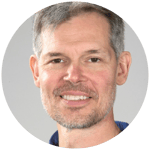
Rodrigo Mariño,
D.M.D., PhD
Professor of Population Oral Health at the Melbourne Dental School
Rodrigo Mariño is a public health dentist, Professor of Population Oral Health at the Melbourne Dental School, The University of Melbourne where he has worked since 2004. Rodrigo has a dental degree from the University of Chile, a Master's in public health, and a PhD from the University of Melbourne.
Rodrigo’s research strongly focuses on oral health promotion and reducing inequalities in oral health status. Rodrigo has excellent research expertise in social epidemiology, dental workforce issues, public health, migrant health, Information and Communication Technology, gerontology, and population oral health.
He has established links and maintain continuous contact and research activities with major research and academic groups in Australia and overseas Rodrigo has published more than 150 papers in scientific journals, several major research reports and 34 Books Chapters.
Rodrigo was the founder and first President, of the e-Oral Health Research Network, IADR, and member of the editorial board of three international, peer-reviewed journals. Rodrigo has also been a consultant to the Pan American Health Organization/World Health Organization in Washington, DC.
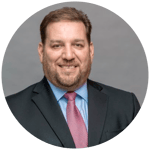
Jorge E. Valdez
García, M.D., PhD
Dean School of Medicine and Health Sciences TecSalud Tecnológico de Monterrey
Jorge Valdez is a Surgeon, specialist in Ophthalmology with a Master's Degree in Medical Sciences and a Doctorate in Research in Surgery.
National Researcher level1 from the National System of Researchers. Author of 5 books, 17 chapters and 109 research articles in the areas of Visual Sciences, History of Medicine, as well as Medical and Health Science Education. has 25 years of undergraduate and graduate teaching experience.
He has senior management experience in the health sector in the areas of Strategic Planning, Quality and Health Education. He has chaired more than 5 national and international Medical Associations in the field of his discipline.
Dr. Valdez has been an accreditor on two occasions of the PUIS-SMO Biennial Ophthalmology Prize, the Coparmex National Health Prize, the "Dr. Carlos Canseco"; Medical Merit Medal, the Municipality of Monterrey, the "Dr. Jorge Rosenkranz” for Medical Research, Award for Scientific Career from the College of Surgeons of the State of Nuevo León, Award for Teaching and Research Work from Tecnológico de Monterrey.
Dr. Valdez is also a Fellow of the Mexican Academy of Surgery. Founding member
of the National Academy of Medical Education.
Jorge E. Valdez-Garcia, M.D., MD-PhD, is the Dean of the School of Medicine and
Health Sciences (EMCS) for Tecnológico de Monterrey chairs the Pan American
Ophthalmology Foundation and he is also President of the Mexican Association of
Faculties and Schools of Medicine.
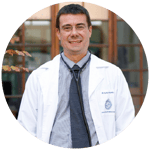
Klaus Püshcel I.,
M.D., MPH, MSc
Director for Medical Education Center School of Medicine Universidad Catolica de Chile
Klaus Püschel MD,MPH,MSc is a Full Professor and Director of the Centre for Medical and Health Professions Education at Pontificia Universidad Católica de Chile (PUC). He completed his residency program in Family Medicine at PUC and holds a Master Degree in Public Health at the University of Washington in Seattle and a Master Degree in Bioethics at the University of Leuven in Belgium. Dr. Püschel was the Director of the School of Medicine at PUC from 2014 to 2018 and chair at the Department of Family and Community Medicine from 2008 to 2013.
He has worked as a clinician educator in primary care for 20 years combining clinical practice, medical education and community based primary care research. He enjoys good conversations with friends, students and colleagues, better with a glass of Chilean wine.
He says his family of four children always brings excitement, beauty and new challenges to his life. In the last 10 years he has been running full marathons in very diverse places such as La Habana, Buenos Aires, Paris and Athens. For him, “there is nothing better for knowing new places that being in the streets”. In spite of his busy life, there is always time for a good cappuccino. His research areas are social accountability, professional identity and primary care.
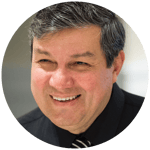
Melchor Sánchez
Mendiola, M.D.
Coordinator Open University Educational Innovation and Virtual Education Universidad Nacional Autónoma de México
Melchor Sánchez, M.D. is a Mexican Pediatrician. He studied medicine and pediatrics at the Mexican Army and Air Force University in Mexico City. He worked as Clinical Research Fellow at the Clinical Research Center, Massachusetts Institute of Technology, Cambridge, MA, USA. He has a Master in Health Professions Education, University of Illinois at Chicago, USA, and a Doctorate in Educational Sciences, Health Sciences Education, National Autonomous University of Mexico (UNAM) in Mexico City. Level II National System of Researchers, National Council of Science and Technology, Mexico.
He has been a lecturer in > 500 continuing education courses in Mexico and abroad. He is author and coauthor of 105 peer reviewed publications in national and international journals, related to pediatrics, critical care, human nutrition and metabolism, medical education, medical informatics. He published eight books and 42 book chapters related to evidence-based medicine, medical informatics, and medical education. He has 1,003 citations in the Science Citation Index. He has directed 34 theses in residents, general physicians, master and DSc in health sciences education. He is Associate Editor of Advances in Health Sciences Education, and Editor-in Chief of the Mexican journal Investigación en Educación Médica. Member of > dozen academic organizations: American Academy of Pediatrics, Mexico National Academy of Medicine, Mexican Academy of Pediatrics, Association for Medical Education in Europe, Mexican Council of Education Research, among others. He is Member-At-Large, National Board of Medical Examiners, USA.
Melchor Sanchez, MD, is full tenured Professor of Medical Education at UNAM Faculty of Medicine, Mexico City. He is also responsible for the Master in Health Sciences Education program at UNAM. Currently is the Coordinator of Open University, Educational Innovation and Distance Education at UNAM, in Mexico City.
Modal title
.png)
Agenda
Central Daytime Zone
Welcoming Video
Prof. Jenny Dixon
U21 Provost
Welcoming Video
Clinical Simulation Workshop
Development of online simulation learning materials, simulation assessment applications and formal education for simulation practitioners
- Opening and welcome – Prof. Craig Vincent-Lambert (Chair U21 Health Sciences Simulation Learning Group)
- Introduction to simulation learning activities at Tec De Monterrey - Elena Ríos Barrientos, MD
- Training Video Project update - Allison Mandrusiak, PhD
- Update on the PG Diploma in Clinical Simulation – Karien Henrico, PhD
- Update on the SATLAB Application project – Andrew Makkink, PhD
- Closure and the way forward – Prof. Craig Vincent-Lambert, PhD
Clinical Simulation Workshop
U21 HSG Interprofessional Education Group (IPE) Forum
Developing Collaboration for IPE Research
Are you interested in interprofessional education (IPE)?
Does research in this important area spark your interest?
In this session, hear from presenters about developing collaboration for IPE research, around topics including:
Key areas of focus for research in IPE; What counts as good scholarship in IPE research? and What topics might we progress?
There will be time for questions to the panel, so come along and join the conversation.
- Welcome Sharon Buckley (Chair)
Dr. Silvia Olivares Olivares (Tecnológico de Monterrey) – video about IPE initiatives at Tecnológico de Monterrey - Introduction Sharon Buckley
- Keynote presentation "What counts as good scholarship in IPE research?" =
Prof. Jill Thistlethwaite - Panel
- Key areas of focus for IPE research = Dr. Emily Audet, Royal Wolverhampton Hospitals Trust, UK
- What topics might we progress? = Dr. Fraide Ganotice , Hong Kong University - Panel discussion - Panel members = Dr. Emily Audet, Dr. Fraide Ganotice , Dr. Silvia Olivares Olivares
- Summary + Close Sharon Buckley
U21 HSG Interprofessional Education Group (IPE) Forum
Sustainable Development Goals Forum
The impact of COVID 19 on the SDGs
This year, our Annual SDG Workshop will focus reflections and discussions on identifying the impact that Covid has had on the SDGs and how the goals have been affected.
- Session topic: ‘Students as advocates for the SDGs’
Contributors:
University of Melbourne
University of Johannesburg
University of Glasgow Chair: Susanne Brokop, Lund University - Keynote Session
Session Topic: Global Vaccine Inequity- Impact on SDGs
Speakers: Professor Refilwe Mafuya-Phaswana, University of Johannesburg & Professor Manuel Perez, Tecnológico de Monterrey
Chair: Sandra Cardenas, Tecnológico de Monterrey - Session topic: ‘The impact of the COVID 19 pandemic on how we teach and facilitate learning about the SDGs’ Contributors:
University of Johannesburg
University of Birmingham
Tecnológico de Monterrey
Chair: Nadia D’alton, University College Dublin - Closing remarks- Cliona O’Sullivan, University College Dublin, Co-Chair of the Universitas 21 Sustainable Development Goals Initiative
Sustainable Development Goals Forum
Virtual International Doctoral Student Forum
One Health Related Research
The Virtual International Doctoral Student Forum aims to encourage students to share their research and educational experiences in the pandemic and post-pandemic eras, considering the diversity of career opportunities available following completion.
Welcome Address by Arturo Santos García, MD, PhD. School of Medicine and Health Sciences. TecSalud
Master sessions
- Prof. Marco Antonio Rito Palomares, PhD.
“Research strategies against COVID-19 from TecSalud”
Q&A: Mirna Alejandra González González, MD, PhD. TecSalud - Joaquín Alejandro Zúñiga Ramos, MD, PhD.
“Emerging respiratory viruses, lung damage mechanisms”. TecSalud
Q&A: Patricia Segura Medina, BSD, PhD. TecSalud - Cynthia Mayté Villarreal Garza, MD, PhD.
“From necessity to research and from research to clinical application in Breast Cancer in Mexico”. TecSalud Hospitals.
Q&A: Héctor Marcelino Díaz Pérez, PhD student. TecSalud
Doctoral Student Presentation
- Q&A: Raquel Cuevas Díaz Durán, PhD. TecSalud
- Q&A: Mildred Vanessa López Cabrera, PhD. TecSalud
Discussion forum
“New reality in the post-Covid stage: process that the doctoral student lives”
Virtual International Doctoral Student Forum
Communications Meeting
Cutting through the noise and sharing your voice
Representatives from the U21 HSG Communications Group will discuss how your university’s communications team promotes your expert perspective.
Welcome and Introduction: Claire Packer (Chair)
Presentations:
- Claire Packer and Caroline Durbin from the University of Birmingham’s communications team will discuss ‘How to share your voice without publishing a paper’. Using examples from the COVID-19 pandemic they will talk through how they worked with academics and professional services colleagues to make the most of networks, events, videos and opinion pieces to raise the profile of colleagues and the University without waiting for a paper to be published.
- Margarita Espino Barros Jiménez from Tecnológico de Monterrey will talk through further examples from the COVID-19 pandemic, including how the communications team promoted a mental health initiative set up by medical researchers.
Close Remarks
All are welcome to attend in what promises to be an insightful session.
Communications Meeting
Discipline Group Meeting – Biomedical Sciences
Teaching laboratory skills post-Covid
One of the greatest challenges in Higher Education during the Covid pandemic, especially for STEM and healthcare disciplines, is the delivery of skills training. In Biomedical Science, most laboratories were closed or operating with greatly reduced capacity. The response of the education community has been remarkable, with many innovative examples of delivering lab skills training. These approaches, combining physical and digital approaches to teaching and learning, will be explored during this session. We will hear from our key speakers who have implemented these approaches, as well as the views of our students. This will be followed by a Q&A panel session. Please join us for what promises to be an enlightening session, and join the discussion on how we deliver lab skills training in the future. This session will be relevant to all disciplines in U21 HSG where skills training is a key element of the educational requirements.
Agenda
- Welcome and introduction – John Curnow
- Presentation 1:
Teresa Thomas, University of Birmingham: ‘What have we learnt from the replacement of live practicals with online alternatives? A holistic approach to practical and research skills delivery’ - Presentation 2:
Mike Shipston, University of Edinburgh: ‘Enhancing practical and research skill development through integration of digital delivery’ - Questions and discussion for Presentation 1 and 2
- Presentation 3:
Gee Chong Ling, University of New South Wales: ‘Creation of interactive virtual laboratory lesson using immersive technology’ - Presentation 4:
Tom Flanagan & Mark Pickering, University College Dublin: ‘The Zoom Womb: Development & Nurturing of Innovative Online Anatomy Classes (at UCD Medicine)’ - Questions and discussion on Presentation 3 and 4
- Final discussion and close – John Curnow
Discipline Group Meeting – Biomedical Sciences
University Mental Health Meeting
Theme: The U21 University Mental Health Declaration in a Post-Covid World
OnSession: Hosts - Barbara Dooley, UCD, Maria Gardini, University of Glasgow and Annie Temane, University of Johannesburg
Facilitator: Professor Barbara Dooley, University College Dublin: Introduction to the session, speakers and any housekeeping.
Speaker 1: Professor Annie Temane, University of Johannesburg and Dr Maria Gardini, University of Glasgow
Presentation: U21 Declaration and overview of the U21 Mental Health Working Group Student Fellowship
- Brief overview of the U21 University Mental Health Declaration and key principles.
- Introduction of the student fellow mental health project against Principle 2: Students and staff are at the heart of our concern; therefore all discussions and delivery of improved services around mental health will consult and engage with the community it aims to serve
- Brief overview of the aims and process for the student fellowships and introduction of the fellows.
Speaker 2: Student Group: Joseph Lawrence, University of Glasgow, Amelia Hilton, University of Glasgow, Mapaseka Dolo, University of Johannesburg and Siphosethu Cele, University of Johannesburg
Presentation: U21 Mental Health Working Group Student Fellows
- Initial reflections on how the declaration applies in their universities.
- Overview of the process they are undertaking as part of the fellowship
- What unique perspectives can students bring to a process of understanding mental health responses in universities.
Q&A: Facilitated by Maria and Annie
Speaker 3: Gareth Hughes, Clinical Lead Student Minds, University of Derby
Presentation: “Whole university approaches to student mental health.”
Q&A and wrap up facilitated by Barbara Dooley
University Mental Health Meeting
International Development Group (IDG) Meeting
Theme: Challenges around supporting international students during the pandemic, and ideas for post-pandemic support including ongoing online opportunities
Agenda
- Welcome and introduction – Margaret Tiuchta, University College Dublin (Chair)
- Series of five-minute presentations from U21 HSG member universities:
- Irene Hui Senior International Placements and Partnerships Officer
Faculty of Medicine
The University of Queensland - Dr Rodrigo Figueroa
Director of International Affairs
Pontificia Universidad Católica de Chile - Michelle Beagan
Senior Partnerships Advisor
The University of Edinburgh
- Irene Hui Senior International Placements and Partnerships Officer
- Questions and discussion on presentations and overall theme.
- Final discussion and close – Margaret Tiuchta
International Development Group (IDG) Meeting
Discipline Group Meeting – Dentistry
How dentists perceive & address unique patient communication challenges in general dental practice by Darina Nirmalann
Dentistry keynote lecture "How dentists perceive & address unique patient communication challenges in general dental practice" by Darina Nirmalann.
- Q&A Session
- Dentistry discussion forum
Discipline Group Meeting – Dentistry
Discipline Group Meeting – Medicine
The Discipline Groups provide members across the U21 HSG an opportunity for networking, sharing of information and resources relevant to their discipline area and, collaborating on joint projects.
Secrets for high performing Interdisciplinary Health Teams
Dr. César Lucio, MD
- Welcome & Introduction, Manuel Pérez
- Main Conference, Dr. César Lucio
- Discussion forum
- Q&A Session
- Closing remarks
Discipline Group Meeting – Medicine
Cultural Activity- Mexican Muralism: Talk
Lizzette Zaldivar, Leader of Artistic Heritage at Tecnológico de Monterrey, will give you a presentation of our main Mural at Tecnologico de Monterrey Campus Monterrey, which is a high relief carved in rock and adorned with mosaic. It represents the daily triumph of civilization and culture over the dark forces of stagnation and apathy. To illustrate this, Jorge González Camarena chose the battle and victory of Quetzalcóatl over Tezcatlipoca..
A presentation of our Mural History of Medicine of 1969, by José Reyes Meza (1924-2011), at Tecnológico de Monterrey School of Medicine and Health Sciences, CITES building (Center for Innovation and Knowledge Transference in Health). Cultural Heritage of Tecnológico de Monterrey®.
Lizzette Zaldivar
She has a bachelor's degree in Visual Arts at the National School of Plastic Arts of the UNAM. A Master in Art History at the Faculty of Philosophy and Letters of the UNAM. She has been dedicated to the implementation and management of artistic and educational projects in museums INBA , for over ten years and in research, academic work and project management of art exhibitions. Her has been exhibited individually and collectively in Mexico, Spain, Argentina, Colombia and the Czech Republic.
Cultural Activity- Mexican Muralism: Presentation
Discipline Group Meeting – Health & Rehabilitation Sciences
Digital Learnings for a Post-Covid World
Amongst the disruptions caused by a global pandemic, this has been a most fruitful time for educational innovation. Hear from educators across the U21 Health and Rehabilitation Sciences network who have discovered creative ways to address teaching and learning challenges, drawing on digital learnings as we look towards the future.
- Welcome, overview of meeting - Chair
- Invited presentation:"Developing the Global Health Challenges Digital Module"- Ben Ellis (UoB)
- “Trade show”
- Showcase of digital strategies
- Share tips and tricks
- Share advice for longevity - Core members (or proxy):
- Emma Beckman (UQ)
- Lynn Smith (UJ)
- Javiera Fuentes (PUC)
- Allison Mandrusiak (UQ)
- Susanne Brokop (Lund) - Q&A
- Close Chair
Discipline Group Meeting – Health & Rehabilitation Sciences
Discipline Group Meeting – Nursing & Midwifery
Compassion after Covid-19
The nursing and midwifery discipline meeting will include 5 presentations focused on nursing and midwifery research and experiences of compassion during and in response to the COVID-19 global pandemic. There will be presentations from UK, New Zealand and South Africa representing collaborations across the U21 network. There will also be an opportunity for participating schools to introduce themselves and their teaching & learning and research focus. We are looking forward to seeing as many U21 university members from our Nursing and Midwifery schools as possible.
Theme presentation from:
- Welcome and introduction - Julia Slark
- Short update from each member university – All
- Presentation 1 and 2
- Annie Topping, University of Birmingham and Stephen Jacobs, University of Auckland to deliver a presentation on the wellbeing of nurses
- Mrs Lerato Matshaka (PhD Candidate), University of Johannesburg ‘The impact of COVID-19 on student nurses and nursing academics at higher education institutions in South Africa’. - Questions and discussion on presentations 1 and 2
- Presentation 3 and 4:
- Alastair Hewison, University of Birmingham and Gigi Lim, University of Auckland “Compassionate Leadership in Healthcare: an international study of the experience of health professionals”
- Maria Pearson, University of Nottingham “Compassion: an exploration of student midwives’ academic and clinical learning during their midwifery education.” - Questions and discussion on presentations 3 and 4
- Final discussion and close – Julia Slark
Discipline Group Meeting – Nursing & Midwifery
Discipline Group Meeting – Pharmacy
Implementing Electronic Healthcare Records in Undergraduate Education
The Pharmacy groups session will be workshop/discussion on ‘Implementing Electronic Healthcare Records in Undergraduate Education.’ Lead by Dr Sarah Pontefract, Lecturer in Clinical Pharmacy and Therapeutics, School of Pharmacy, University of Birmingham, and Dr Kurt Wilson, Teaching Fellow, Lead for Prescribing, Medical School, University of Manchester. This subject will be of interest to others besides the Pharmacy Group and is open to anyone from any of the professions interested in this important area of preparing healthcare professionals for the shift from paper to digital systems.
- Welcome – Anthony Cox, Chair of the U21 HSG Pharmacy Discipline group
- Presentation - Implementing Electronic Healthcare Records in Undergraduate Education.
by Dr Sarah Pontefract, Lecturer in Clinical Pharmacy and Therapeutics, School of Pharmacy, University of Birmingham, and Dr Kurt Wilson, Teaching Fellow, Lead for Prescribing, Medical School, University of Manchester. - Q&A session
- Wrap up and close – Anthony Cox
Discipline Group Meeting – Pharmacy
Opening Addresses
Guillermo Torre Amione, M.D., PhD
Rector of TecSalud and Vice President of Research at Tecnológico de Monterrey
Opening Addresses
Core Meeting Session I
Plenary: Prevention, Wellbeing and Longevity before and after COVID-19
- Guillermo Torre, MD, PhD
TecSalud
The search for longevity can be related to the slowdown in aging, and psycho-physical wellbeing is often associated with the lifestyle, mainly to human physical activity and nutrition. Unfortunately, marketing and publicity are oriented to promote non-healthy food and nutritional habits. In Mexico, the pandemic evidenced a higher morbidity rate than other countries due to pre-existing chronic diseases like diabetes, obesity, and hypertension. Mental health issues have been exacerbated by COVID lockdown and social, political, and educational disruptions, challenging the safety and wellbeing of several age groups. Besides those risk factors, public and non-public hospitals provide heterogeneous quality care standards. Since prevention and wellbeing are multifactorial, solutions should be part of the plan from several sectors, including health care, education, and government. Collaboration among institutions could address better solutions through resolutive interventions for preventive medicine and a healthy lifestyle. Academic Health Centers provide education, assistance, and advanced research and technology focused on improving and prolonging quality of life. Education for interprofessional education should embrace formal research, innovation, and orientation to prevention instead of treatment. Interinstitutional research should be organized, approved by authorities and free of individual or cultural biases. A new focus for the patient's comprehensive self-care and wellbeing could shape the required social commitment to achieve a cultural change in health in Mexico.
Panel: Healthcare challenges for prevention, wellbeing, and longevity
- Guillermo Torre, MD, PhD
TecSalud - Patrick Felle, MD, MSc
University College Dublin - Jorge Browne, MD, MPH
Pontificia Universidad Católica de Chile - Silvia Olivares, PhD (Moderator)
Tecnológico de Monterrey
Core Meeting Session I
Core Meeting Session II
Plenary: The reality of the pandemic and Health Professions Education: are we living an alternate reality?
- Melchor Sánchez Mendiola, M.D.
Universidad Nacional Autónoma de México
The COVID-19 pandemic has created an unprecedented disruptive and fluid setting, where the priorities and traditional methods of health professions education have been shaken to their core. The current biological and social cataclysm has profoundly affected healthcare systems and universities in a global scale. Training of healthcare professionals at all educational levels (undergraduate, postgraduate and continuous professional development) has had to adapt to many simultaneous changes, including the need for online teaching and learning assessment, the complex situation of clinical care with the resurgence of telehealth and telemedicine, plus a myriad other social, financial, emotional, mental health and personal issues. This tsunami of changes creates an environment where reality seems like a mirage that reaccommodates itself in very short periods of time, making it difficult to plan, develop, implement and evaluate curricula, teaching and assessment methods, faculty development initiatives, as well as reskilling and upskilling needs assessment. There is an urgent need to establish solid diagnoses and remediation strategies for the clinical and psychomotor skills that were not acquired properly during the more severe phases of the pandemic, and to help recover the mental and emotional health of students, faculty and health care professionals. The variety and depth of global and local responses to these challenges, which sometimes seemed insurmountable, are witnesses to the creativity, professionalism and overall resiliency of physicians, nurses, students and all types of healthcare professionals, since during the past year a great number of resources and novel strategies to attempt to solve these issues were created, shared and practiced everywhere. In these multiple-realities cacophony, there are literally thousands of proposals, narratives, anecdotes and tales of creativity and courage, that should serve us to continue recovering from the pandemic in more sensible, educationally sound, sustainable and collaborative ways, adopting systemic thinking strategies, using the lenses of participative and transformational leadership, as well as the foundations of complexity and implementation sciences. Our new reality is here for us to build upon and move to better futures.
Panel: The alternate reality of Health Professions Education
- Melchor Sánchez Mendiola, M.D.
Universidad Nacional Autónoma de México - John Curnow, PhD
University of Birmingham - Lilian Ferrer Lagunas, PhD
Pontificia Universidad Católica de Chile - Silvia Olivares, PhD (Moderator)
Tecnológico de Monterrey
Q&A with panelists
Core Meeting Session II
Discipline Group Meeting – Public Health
The Discipline Groups provide members across the U21 HSG network an opportunity for networking, sharing of information and resources relevant to their discipline area and, collaborating on joint projects.
Theme: Covid-19, implications for policy and training public health professionals
Session summary:
- The session will be chaired by Martin Stafstrom, Lund University
- Health policy implications of the Covid-19 pandemic – Bernard Taderera, University of Johannesburg
- Discussion - How will the pandemic affect MPH program curriculas – Emma Apatu and students from McMaster University
- Discussion
Discipline Group Meeting – Public Health
Discipline Group Meeting – Dentistry (continuation)
Short presentations from members to share experiences of Dentistry education during the pandemic.
Discipline Group Meeting – Dentistry (continuation)
Cultural Activity- Healthy Mexican Cuisine
In this session María Luisa Balli, M,D., PhD., Professor at Tecnológico de Monterrey School of Medicine and Health Sciences, will give you the experience to cook a special delicious healthy Mexican dish and eat it without guilt.
Nopal or Nopalitos, the common name for a cactus, is one of the special ingredients for a healthy meal, combine with eggs, meat or another component, makes wonderful diversity Mexican cuisine dishes.
Nopal pads can be eaten raw or cooked into marmalades, soups, stew and salads, also can be used as traditional medicine.
Our food is sealed with our Mexican folklore, culture and believes. The spirit of our ancestors.
María Luisa Balli, M.D., PhD.
Professor at the Tecnológico de Monterrey School of Medicine and Health Sciences, is a Medical Doctor, with a Master in Teaching Biological Sciences, and a Doctorate in Clinical Nutrition. She also has an International Master in Nutrition and Dietetics, María Luisa Balli is certified as Educator in Diabetes and Healthy Cuisine for a Healthy Life, also is a member of the American Association of Diabetes Educators, National Wellness Institute, American College of Wellness, Medical Fitness Association, American Dietetic Association, Institute of Lifestyle Medicine and Consortium of Integrative Medicine.
Cultural Activity- Healthy Mexican Cuisine
Executive Committee Meeting
CLOSED MEETING
Executive Committee Meeting
University Mental Health Meeting (continuation)
Theme: Focus on mental health and wellbeing of PhD/PGR students
Session: Hosts – Vivienne Browne, Orygen and Stuart Carney, UQ
Facilitator: Vivienne Browne, Orygen (University of Melbourne): Introduction to the session, speakers and any housekeeping.
Speaker 1: Belinda Bern Director, UQ Graduate School and Dr Stacey Parker, School of Psychology, University of Queensland
Presentation: Higher Degree Researchers Wellbeing, Engagement and Research Culture (WERC) Project, UQ
This project aimed to understand more deeply the factors contributing to a positive HDR experience, including indicators of wellbeing and engagement, such as meaning in life and HDR motivation, and factors that should contribute to these positive HDR experiences, including the role of supervisors, a supportive research environment, having a sense of belonging, as well as other elements such as HDR-life balance. In addition, sources of support and career identity were explored to better understand the needs of candidates during and after their HDR program.
Speaker 2: Professor Carolyn Dewa and Elizabeth Sturdy, Director of Mentoring and Academic Success Initiatives, UC Davis
Presentation: Faculty Academy of Graduate Student Well-Being which is invested in the support of graduate student well-being.
This initiative will train faculty to deliver graduate student seminars on mental health and well-being within graduate programs. It addresses skills to deal with common graduate school stresses by introducing graduate students to the scientific evidence regarding stress and tools for self-care. The skills introduced in this course can be used both personally and professionally. This program is designed to empower faculty across campus to instruct similar courses within their own graduate programs. A train-the-trainer model that will build a cohort of faculty that can lead initiatives to promote graduate student well-being.
Q&A and wrap up Facilitated by Vivienne Browne and Professor Stuart Carney
University Mental Health Meeting (continuation)
Teaching Excellence Award Workshop
- Welcome and Introduction: Angeles Domínguez Cuenca, PhD
- Workshop title: "Experiences of the Online Educator. Pandemic and Beyond"
The COVID 19 pandemic has undoubtedly influenced the practice of education for educators around the world. Necessary digital adaptations were frequently mandated to ensure minimal disruptions to Health Professions Education (HPE), wherever possible. This context provides a unique opportunity to ask a series of questions about HPE, including: how satisfied were HPEs about their roles as teacher prior the pandemic? What were some of the pre-pandemic online educational practices that were emerging for HPEs? In general, how satisfied were students with online learning prior to the pandemic? These questions now form a backdrop to interpret peri-pandemic literature about the experience of educators. More specifically, the purpose of this interactive workshop is to provide an opportunity for U21 Health Sciences Group HPEs to come together to reflect on their experiences as educators from around the world during the pandemic and to review the literature about educator experiences within this unique context. Do we see our educator selves and our pandemic stories reflected in the available literature? Why might this matter? Focusing on the educator voice, we aim to bring to the fore a discussion about what makes an educational practice sustainable during these challenging times and how the educator experience is critical in shaping an ongoing agenda of student engagement. - Facilitated by Dr Norman Ng, University of Queensland & Dr Sheila Harms, McMaster University
- Breakout rooms
- Closing remarks
Teaching Excellence Award Workshop
Deans of Medicine Meeting
CLOSED MEETING
Deans of Medicine Meeting
Welcoming video
Patrick Felle, MD, MSc
Chair of the U21 HSG
Welcoming video
Core Meeting Session III
Plenary: Post-Covid World: Leaving no one behind
- Rodrigo Mariño, D.M.D., PhD
Melbourne Dental School
The University of Melbourne
During this COVID-19 pandemic, the ability to reach out to the community, social, health and education services providers remotely through conventional face-to-face interaction, was challenged and threatened. Nonetheless, much of the activity moved online. Digital solutions available today (e.g., computers, internet, smartphones, and apps) allowed and provided the foundation for alternative ways to interact and provide services. In particular, the current healthcare and education systems have met a wide range of challenges as well as opportunities initiated by this pandemic. It also provided new perspectives on post pandemic actions to keep, expand and accelerate these advancements and attain future requirements. Still, the COVID-19 pandemic has accentuated the socioeconomic and academic gaps affecting millions of people around the world, both within and between countries, as not everybody has the same access to these tools, or the capacity to use digital tools. This has increased unfairness around access to healthcare and education. Now is the time to inform post-pandemic policies needed to recover and rebuild national health and education systems. We need an approach based in digital technology, but one that ensures that no one is left behind. This presentation will discuss the lessons learnt when applying digital solutions to health and education. It will focus on challenges, and approaches to digital solutions for the development of programs to help reduce the health inequities.
Panel: Interprofessional reflections from Covid abrupt changes
- Rodrigo Mariño, D.M.D., PhD
University of Melbourne - Ana Cecilia Sosa, DDS
Tecnológico de Monterrey - Arnoldo Riquelme, MD, Med
Pontificia Universidad Católica de Chile - Jorge Martínez, DDS (Moderator)
Tecnológico de Monterrey
Q&A with panelists
Core Meeting Session III
Core Meeting Session IV
Plenary: Academic excellence with Social Accountability in Covid times
- Klaus Püshcel I., M.D., MPH, MSc
Centre for Medical and Health Professions Education
Faculty of Medicine
Pontificia Universidad Católica de Chile
The Covid-19 pandemic has enlarged health disparities around the world. The effect has been especially dramatic in Latin America. The five years pre-pandemic situation already showed an increasing trend of poverty levels in the region from 27.8% to 30.5%. In this scenario, underserved populations in countries such as Argentina, Brazil, Mexico, and Chile experienced 50% to 400% excess mortality rates from Covid-19 compared to wealthier populations from these countries. Lower access to community and primary care services to assure timely diagnosis, contact tracing, and isolation, in addition to lower access to intensive care units, were some of the factors associated with higher fatality rates among underserved populations in Latin America. In contrast, the region has experienced an outbreak of new medical schools during the last three decades. Most of them have declared that social accountability and primary care were at the core of their mission. However, the evidence shows that most medical schools in the region do not have implemented strong primary care training programs and that there is high variability in their level of social accountability measured by a standardized instrument. The Covid 19 epidemic has highlighted specific areas for improving social accountability among medical schools.
Panel: Future implications of Social Accountability
- Klaus Püshcel I., M.D., MPH, MSc
Pontificia Universidad Católica de Chile - Cynthia Villarreal-Muraira, MPP
Tecnológico de Monterrey - Marcio Gomes, MD, PhD
University of Ottawa - Silvia Olivares, PhD (Moderator)
Tecnológico de Monterrey
Q&A with panelists
Core Meeting Session IV
Core Meeting Session V
Plenary: Healthcare leadership development in the post-Covid world
- Jorge E. Valdez García, M.D., PhD
Dean of School of Medicine and Health Sciences
Tecnológico de Monterrey
According to Oliver Wendell Holmes, "Greatness is not where we stand, but in what direction we are moving." These times where we face the challenges of post covid world require people to see beyond the everyday problem. The leaders are responsible for setting the direction we must go, but they must have the skills to convince others to move in that direction. Our challenge as an institution of higher education is to develop the talent that will face the emergent reality and create new opportunities for a healthier society. We need to educate leaders that will shape the future in the health sector. Leadership exists when people cease to be victims of circumstances and actively participate in creating new possibilities. Leadership involves creating an environment where human beings continually deepen their understanding of the context and become more capable of participating in global events. In this sense, leadership is about creating new realities. The Medical and Health Science Schools need to promote the concept of self-leadership in their students. This concept is the capacity for intentional and conscious influence on one's thoughts, emotions, and behaviors to achieve the personal goals we have set ourselves. This new reality of a post-pandemic world demands more leaders to ensure a healthy environment for human flourishment.
Panel: Leadership perspectives across institutions
- Jorge E. Valdez García, M.D., PhD
Tecnológico de Monterrey - John Leach, MD
University of Glasglow - Felipe Heusser, MD
Pontificia Universidad Católica de Chile - Silvia Olivares, PhD (Moderator)
Tecnológico de Monterrey
Q&A with panelists
Core Meeting Session V
Wrap up
Jorge E. Valdez García, M.D., PhD
- Closing Address Virtual Farewell Toast
- Final Reports U21 Health Sciences Group Annual
- Meeting 2021
- Presentation of 2022 Annual Meeting Host
- Reports U21 Health Sciences Group Annual
- Meeting 2021
- Feedback Survey
Feedback Survey
https://bit.ly/3ldLJzs
The survey will go live on Wednesday 15th Sept at 12pm BST / 6am CDT
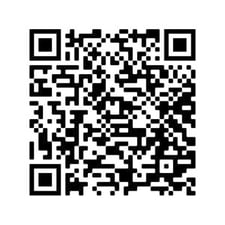
Final ReportsU21 Health Sciences Group Annual Meeting 2021
- Clinical Simulation Workshop
- Virtual International Doctoral Student Forum
- Sustainable Development Goals Forum
- Communications Meeting
- International Development Group (IDG) Meeting
- Executive Committee Meeting
- Discipline Group Meeting – Biomedical Sciences
- Discipline Group Meeting – Dentistry
- Discipline Group Meeting – Health & Rehabilitation Sciences
Wrap up
Cultural Activity- Mezcal Tasting
Enrique Támes, PhD, Human Flourishing Projects Director, an expert in Mezcal, will give you a virtual tour of the essence of Mezcal, way to drink it, how to flavor it, how to choose a brand and of course the artisanal experience of tasting.
In this way you can appreciate the flavor, the color, the aroma; the spirits of tasting Mezcal.
Enrique Tamés
He is a philosopher with a master’s degree in education and a PhD in Innovation. The former Dean of the School of Humanities and Education at Tecnológico de Monterrey, Enrique was also regional Vice-Rector at University Tecmilenio, and Director of the Institute of Happiness and Wellbeing.
During his career, he has researched and published in a variety of areas. In addition to doing research in Latin American cultural values, he has spent a great deal of his career developing our understanding of the impact of aesthetics, contemporary art, technology, and education on society. His most recent topic of interest is understanding wellbeing and happiness, from a philosophical approach, in today's world.
He has been a visiting researcher at the Getty Institute, the University of Loyola in Chicago, as well as a visiting professor at the University of North Carolina at Chapel Hill, and at Yale University. In 2013 he developed and taught the course Latin American Cultural Values, a MOOC for more than 40,000 students worldwide.
Enrique is a Certified Coach (Newfield Consulting) and is Certified on Appreciative Inquiry (Case Western Research University) as well as alumni of Singularity University. Enrique is a photographer, he has participated in solo and collective expositions, he promotes the understanding of the cultural heritage of mezcal, and practices meditation (Vedic, Qi Gong) on a daily basis.
Cultural Activity - Mezcal Tasting
Cultural Activities
Mexican Muralism: Presentation
Lizzette Zaldivar, Leader of Artistic Heritage at Tecnológico de Monterrey, will give you a presentation of our main Mural at Tecnologico de Monterrey Campus Monterrey, which is a high relief carved in rock and adorned with mosaic. It represents the daily triumph of civilization and culture over the dark forces of stagnation and apathy. To illustrate this, Jorge González Camarena chose the battle and victory of Quetzalcóatl over Tezcatlipoca.
A presentation of our Mural History of Medicine of 1969, by José Reyes Meza (1924-2011), at Tecnológico de Monterrey School of Medicine and Health Sciences, CITES building (Center for Innovation and Knowledge Transference in Health). Cultural Heritage of Tecnológico de Monterrey®.
RAICES: Folklore dance performed by Students from Tecnológico de Monterrey.

Lizzette Zaldivar; Has a bachelor's degree in Visual Arts at the National School of Plastic Arts of the UNAM. A Master in Art History at the Faculty of Philosophy and Letters of the UNAM. She has been dedicated to the implementation and management of artistic and educational projects in museums INBA , for over ten years and in research, academic work and project management of art exhibitions. Her has been exhibited individually and collectively in Mexico, Spain, Argentina, Colombia and the Czech Republic.
12:00 to 13:30 hrs.
Mexican Muralism: Presentation
Healthy Mexican Cuisine
In this session María Luisa Balli, M,D., PhD., Professor at Tecnológico de Monterrey School of Medicine and Health Sciences, will give you the experience to cook a special delicious healthy Mexican dish and eat it without guilt.
Nopal or Nopalitos, the common name for a cactus, is one of the special ingredients for a healthy meal, combine with eggs, meat or another component, makes wonderful diversity Mexican cuisine dishes.
Nopal pads can be eaten raw or cooked into marmalades, soups, stew and salads, also can be used as traditional medicine.
Our food is sealed with our Mexican folklore, culture and believes. The spirit of our ancestors.

María Luisa Balli, M.D., PhD., Professor at the Tecnológico de Monterrey School of Medicine and Health Sciences, is a Medical Doctor, with a Master in Teaching Biological Sciences, and a Doctorate in Clinical Nutrition. She also has an International Master in Nutrition and Dietetics, María Luisa Balli is certified as Educator in Diabetes and Healthy Cuisine for a Healthy Life, also is a member of the American Association of Diabetes Educators, National Wellness Institute, American College of Wellness, Medical Fitness Association, American Dietetic Association, Institute of Lifestyle Medicine and Consortium of Integrative Medicine.
12:00 to 13:30 hrs.
Healthy Mexican Cuisine
Mezcal Tasting
Enrique Támes, PhD, Human Flourishing Projects Director, an expert in Mezcal, will give you a virtual tour of the essence of Mezcal, way to drink it, how to flavor it, how to choose a brand and of course the artisanal experience of tasting.
In this way you can appreciate the flavor, the color, the aroma; the spirits of tasting Mezcal.
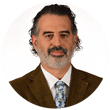
Enrique Támes, PhD.; is a philosopher with a master’s degree in education and a PhD in Innovation. The former Dean of the School of Humanities and Education at Tecnológico de Monterrey, Enrique was also regional Vice-Rector at University Tecmilenio, and Director of the Institute of Happiness and Wellbeing.
During his career, he has researched and published in a variety of areas. In addition to doing research in Latin American cultural values, he has spent a great deal of his career developing our understanding of the impact of aesthetics, contemporary art, technology, and education on society. His most recent topic of interest is understanding wellbeing and happiness, from a philosophical approach, in today's world.
He has been a visiting researcher at the Getty Institute, the University of Loyola in Chicago, as well as a visiting professor at the University of North Carolina at Chapel Hill, and at Yale University. In 2013 he developed and taught the course Latin American Cultural Values, a MOOC for more than 40,000 students worldwide.
Enrique is a Certified Coach (Newfield Consulting) and is Certified on Appreciative Inquiry (Case Western Research University) as well as alumni of Singularity University. Enrique is a photographer, he has participated in solo and collective expositions, he promotes the understanding of the cultural heritage of mezcal, and practices meditation (Vedic, Qi Gong) on a daily basis.
12:00 to 13:30 hrs.
Mezcal Tasting
Virtual International Doctoral Student Forum
Tecnológico de Monterrey, School of Medicine and Health Sciences is delighted to host the 2021- U21 Health Sciences Group Virtual Doctoral Student Forum, in collaboration with the U21 HSG Annual Meeting on Monday 13th September 2021.
The aim of the Doctoral Student Forum is to encourage students to share their research and educational experiences in the pandemic and post pandemic era, considering the diversity of career opportunities available following completion.
We would like to invite doctoral students from a range of disciplines across the U21 HSG member institutions to present their work virtually to the 19 U21 HSG member institutions across the globe.
Topics from all areas of Health Sciences research can be submitted and we particularly welcome submissions from One Health related research.
Students are not required to give an overview of their whole project but rather, a summary of their research.
The Virtual Doctoral Student Forum program will include Masterclasses from expert researchers, student oral presentations and poster presentations. The international review panel will award prizes to the best presentations. Students will also be invited to attend all the virtual plenaries of the U21 Health Sciences Group Annual Meeting. The topic of this year's meeting is ‘Challenges in research in the post-Covid Era’.

Speakers
%2015.03.42.png?width=150&name=Captura%20de%20Pantalla%202021-07-15%20a%20la(s)%2015.03.42.png)
Cynthia Villarreal-Garza,
MD, DSc.
Director of Medical Oncology, Breast Cancer Center TecSalud - Tecnológico de Monterrey
Dr. Villarreal-Garza is a Board Certified Medical Oncologist, Master of Science and Doctorate in Clinical Research. She completed a Breast Cancer Fellowship at the Sunnybrook Odette Cancer Center, affiliated with the University of Toronto.
Since 2007, Dr. Villarreal-Garza is professor at Tecnologico de Monterrey School of Medicine and Health Sciencies. She has been awarded with the 2017 Premio Miguel Aleman Valdes en el Area de Salud, 2017 Premio Mujer Tec, 2013 Premio Bienial de FUNSALUD a la Investigación en Cáncer de Mama, 2009 ASCO International Development and Education Award, 2010 ASCO Cancer Foundation Merit Award and the 2014 Avon Foundation Global Breast Cancer Clinical Scholars Program. She has published more than 100 peer-reviewed manuscripts and is member of the National System of Researchers (II). Her projects dedicated to improving the living conditions of breast cancer patients in Mexico have received funding from Avon Mexico, Susan G. Komen, CIMAB, CONACYT and the City of Hope National Medical Center.
She is currently the Medical Director of the Breast Cancer Center of the two affiliated hospitals of TecSalud, Tecnológico de Monterrey. She created and leads “Joven y Fuerte”, the Mexican Young Breast Cancer Program. She is also the founder of “MILC”, an NGO dedicated to the improvement of cancer and supportive care among breast cancer patients in Mexico.
%2015.04.02.png?width=150&name=Captura%20de%20Pantalla%202021-07-15%20a%20la(s)%2015.04.02.png)
Prof. Marco Antonio
Rito-Palomares, PhD.
Director of Research TecSalud, Tecnológico de Monterrey
Professor Marco Rito-Palomares is Full Research Professor of Bioprocess Engineering in the Tecnológico de Monterrey. Doctorate in Chemical Engineering from University of Birmingham. He is Editor-in-Chief(bio) of Food Bioproducts Processing, as well as editor of Journal of Chemical Technology and Biotechnology, PLOS ONE, and Revista Mexicana de Ingenieria Quimica. He has published more than 170 scientific publications (articles, book chapters, and books), participated in 280 national and international conferences, and has been granted 16 patents. His current research efforts are focused on the development of bioengineering strategies for the predictive design of bioseparation systems that can be used for the recovery and purification of protein, aroma compounds, virus like-particles, cells, protein-based colorants, and stem cells. Particular emphasis is placed on the understanding of the molecular behavior of PEGylated proteins in liquid- liquid extraction systems. He has conducted 28 masters and 17 doctoral theses in Tec de Monterrey programs.
Prof. Rito-Palomares is member of multiple organizations, including the Scientific Committee of the International Foundation for Science, American Chemical Society, Society of Chemical Industry, International Society of the Molecular Recognition, the Mexican Academy of Sciences, and the National Researchers Council (Level III). He has obtained multiple institutional, national and international awards, including: Romulo Garza (2015, 2013, 2005, 2003, 2000), Teaching and Research Award (2010, 2007, 2003, 2000, National Award in Science and Food Technology (2002, 2006), Jubilee Award granted by the Swedish government (2003), and the Visiting Bye-Fellow from Cambridge University (2001). In 2017 he became Dean of Research and Postgraduate Studies at the Tecnólogico de Monterrey School of Medicine and Health Sciences, and In 2018 he became Director of Research at TecSalud of Tecnologico de Monterrey.
%2015.04.30.png?width=150&name=Captura%20de%20Pantalla%202021-07-15%20a%20la(s)%2015.04.30.png)
Joaquín Zúñiga,
MD, DSc.
Tecnológico de Monterrey, School of Medicine and Health Sciences in México City region
Director of the Biosciences Program,
Tecnológico de Monterrey, School of Medicine and Health Sciences in México City region
Doctor Joaquín Zuñiga received his PhD from the National Autonomous University of Mexico, and then moved to Dr. Edmond Yunis’ lab at Harvard Medical School in Boston, MA, where he carried out his Post-doctoral training. Dr. Zuñiga then joined the National Institute of Respiratory Diseases (INER) in Mexico City, where he has conducted clinical research studies in patients with pulmonary tuberculosis and influenza virus infection. Dr. Zuñiga participated in the initial description of the first cases of severe pneumonia caused by the pandemic influenza A/H1N1 virus, which emerged in Mexico in 2009. Since then, Dr. Zuñiga’s research has focused on the study of protective immunity against pathogen, as well as on the epigenetic control of immune responses occurring at the lung. In the recent years he explored the immunopathology of severe forms of COVID-19 and in collaboration with diverse institutions his group have described novel diagnostic methods for SAR-CoV-2 and is participating in the development of peptide based vaccines against this virus. Since 2017, Dr. Zuñiga is the head of Research of the INER, National Investigator level 3 of the National Researchers System of Mexico and is the Director of the Biosciences program at the Tecnológico de Monterrey in Mexico City.
Modal title
.png)
Videos
Posters
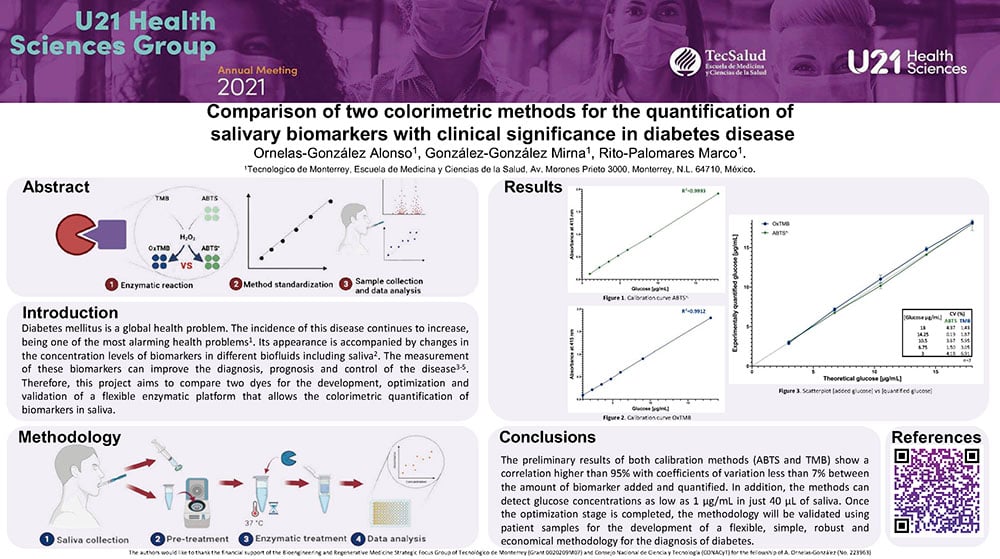
Comparison of two colorimetric methods for salivary biomarker quantification
Author: Alonso Ornelas González
University: Instituto Tecnologico de Monterrey
Discipline: Bioengineering and regenerative medicine
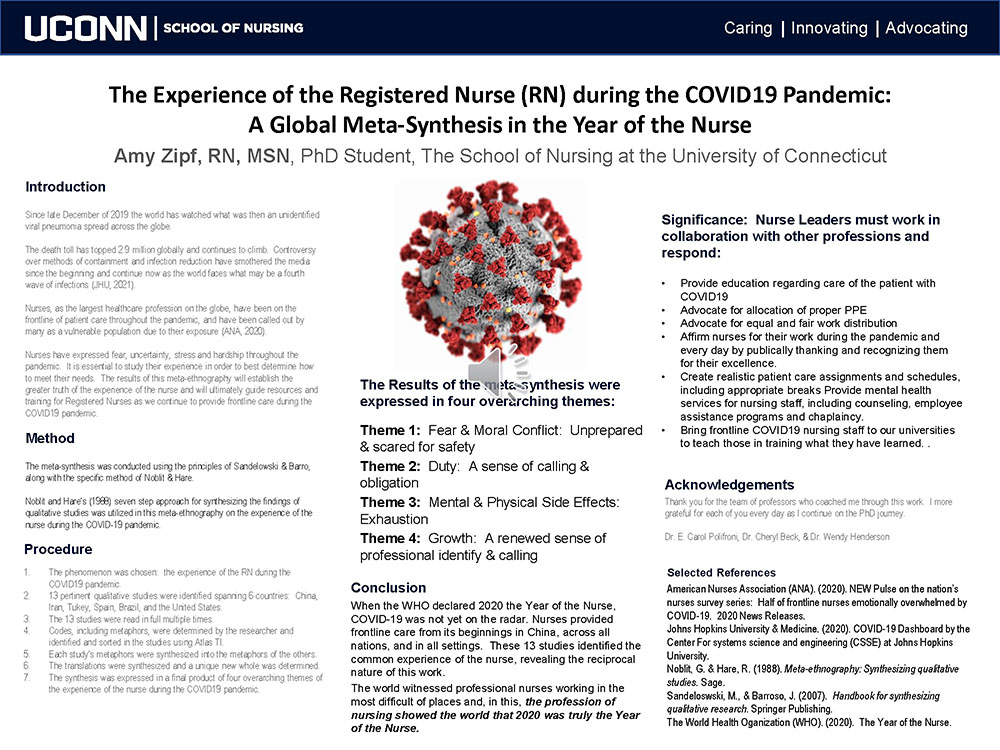
The experience of the Nurse during the COVID19 Pandemic: A Global Meta-Synthesis in the Year of the Nurse
Author: Amy Zipf
University: The University of Connecticut
Discipline: Nursing
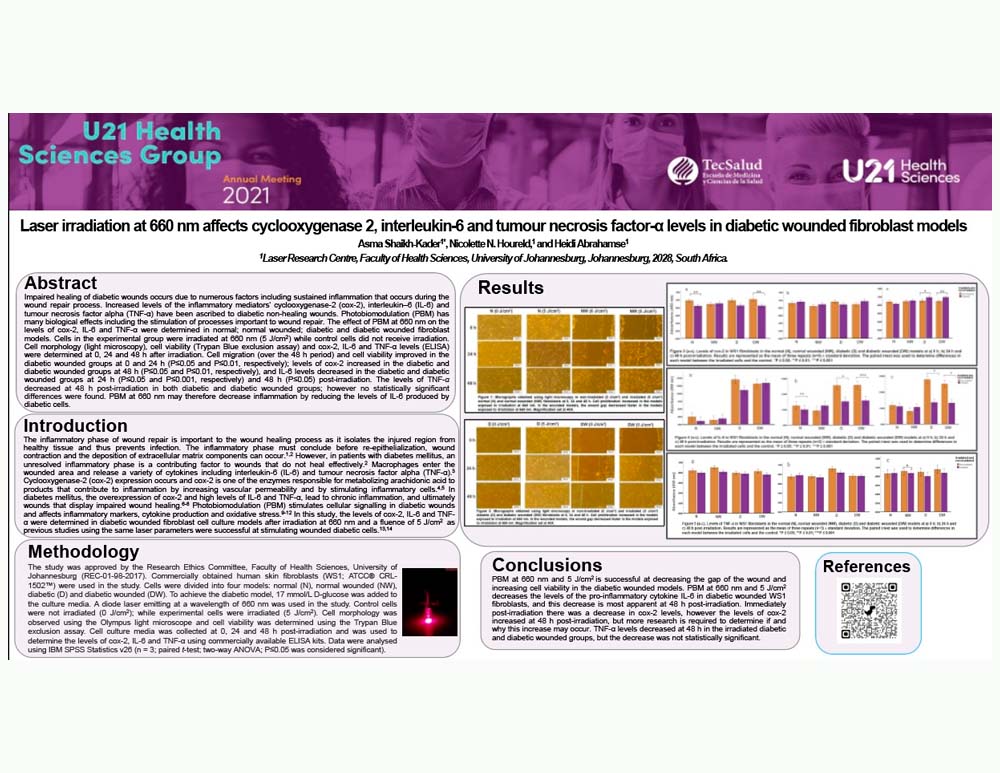
Effect of photobiomodulation on apoptosis and inflammation in an in vitro diabetic wounded fibroblast model
Author: Asma Shaikh-Kader
University: University of Johannesburg
Discipline: Molecular Biology and Biochemistry
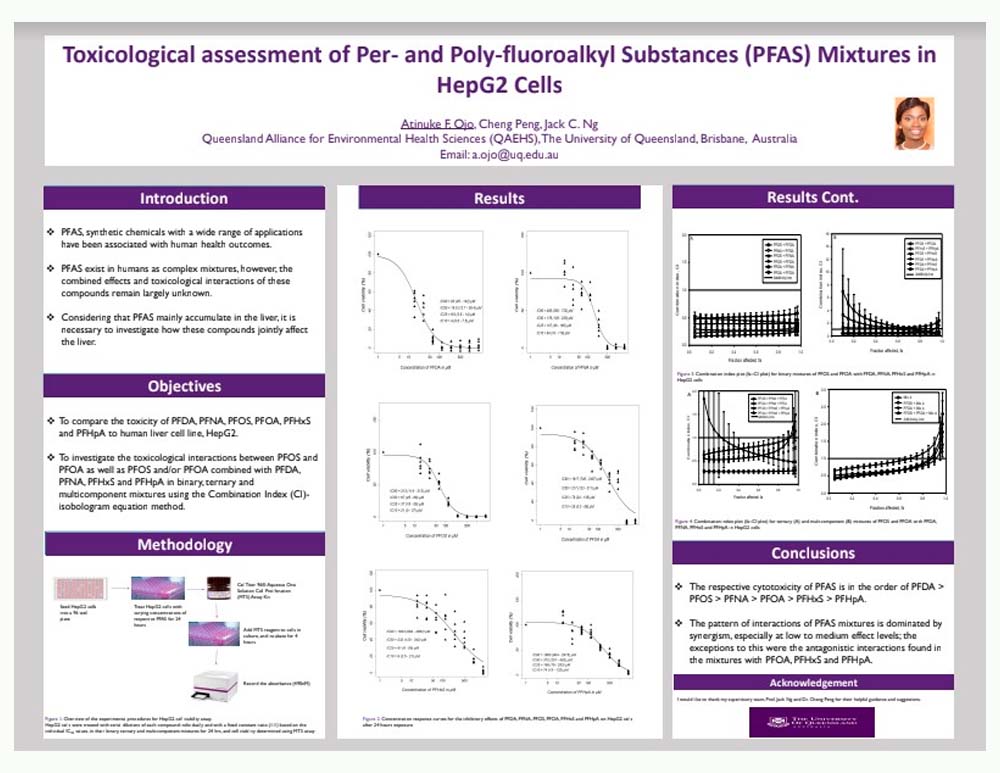
Toxicological assessment of perfluoroalkyl and polyflouroalkyl substances (PFAS)
Author: Atinuke Favour Ojo
University: The University of Queensland, Australia
Discipline: Toxicology
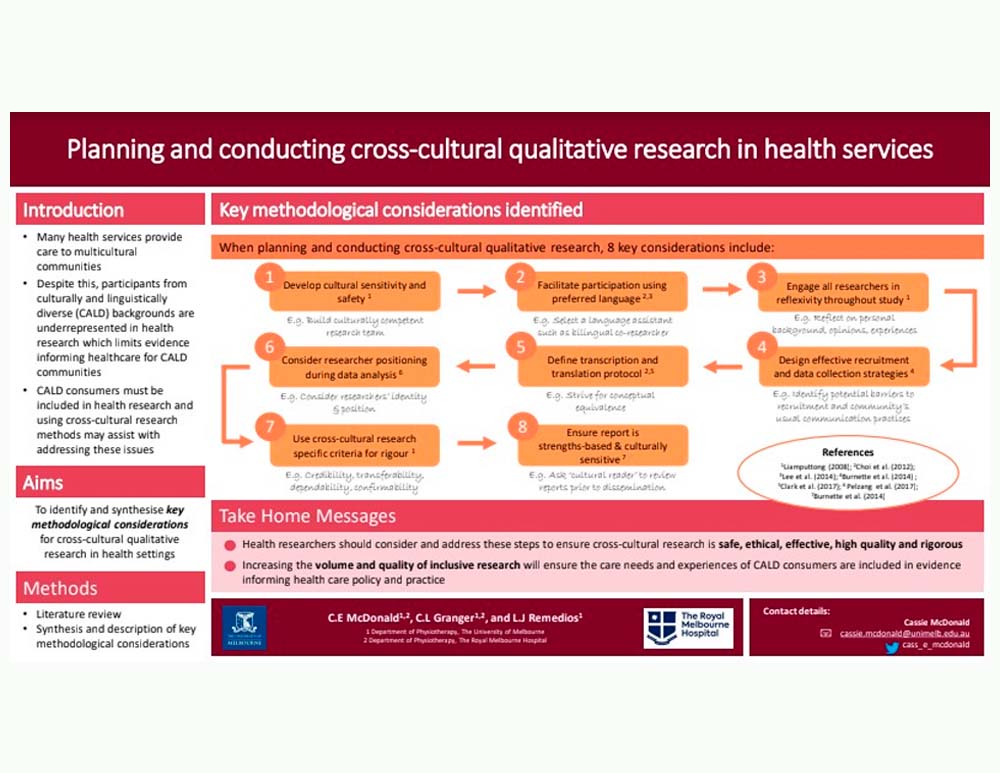
Exploring health literacy responsiveness in hospital waiting areas
Author: Cassie McDonald
University: The University of Melbourne
Discipline: Physiotherapy
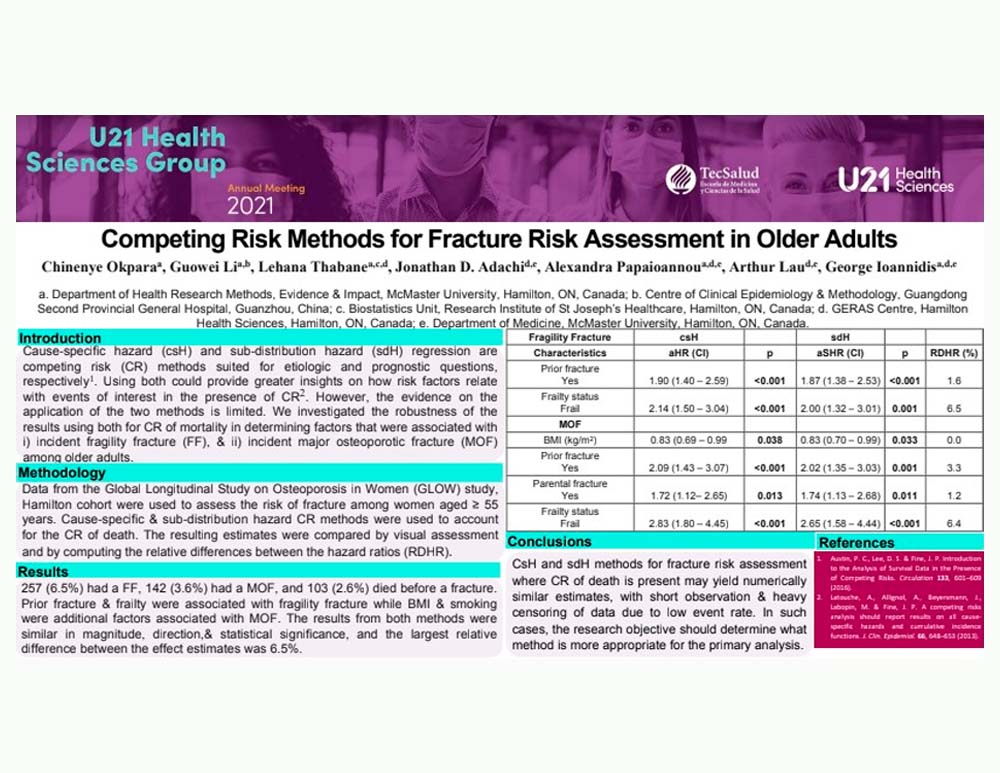
PhD in Health Research Methodology
Author: Chinenye Okpara
University: McMaster University
Discipline: Health Research Methods, Evidence, and Impact
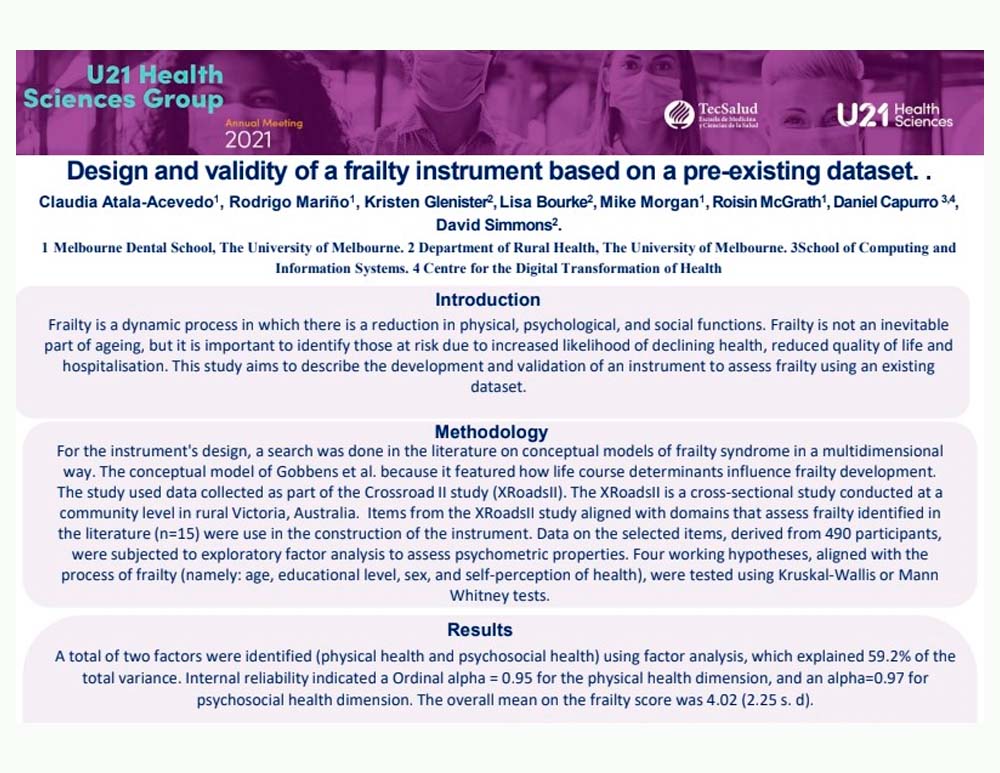
Frailty and oral health
Author: Claudia Atala
University: University of Melbourne
Discipline: Public health
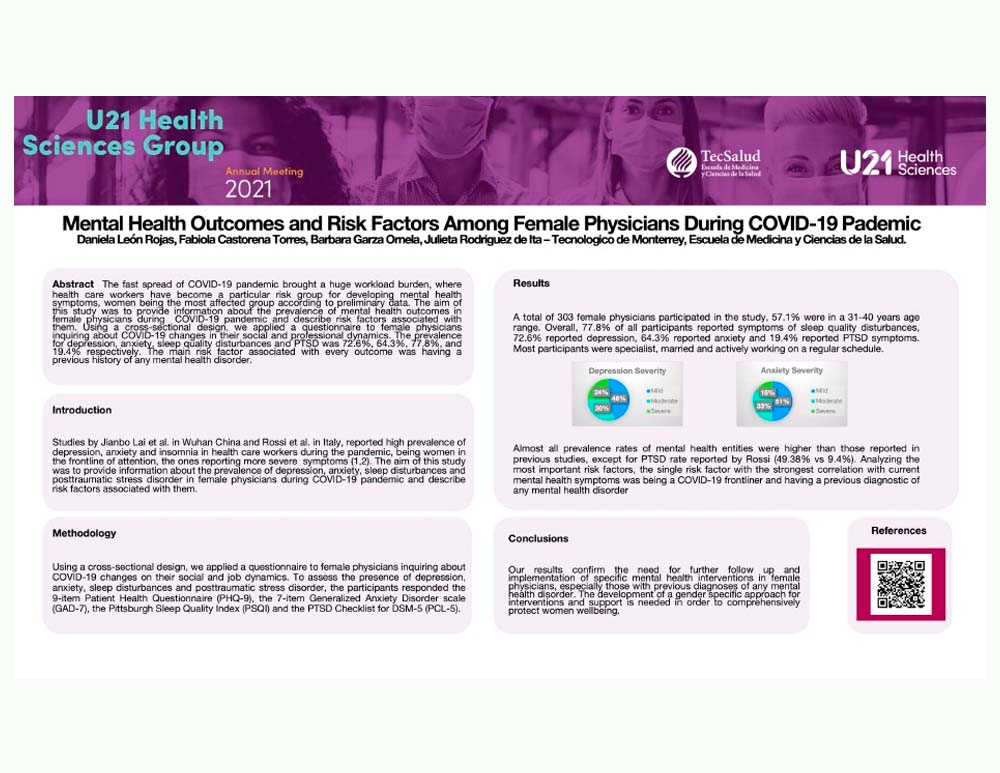
Mental Health Outcomes and Risk Factors Among Female Physicians During the COVID
Author: Daniela Leon Rojas
University: Tecnologico de Monterrey
Discipline: Psychiatry Clinical Science
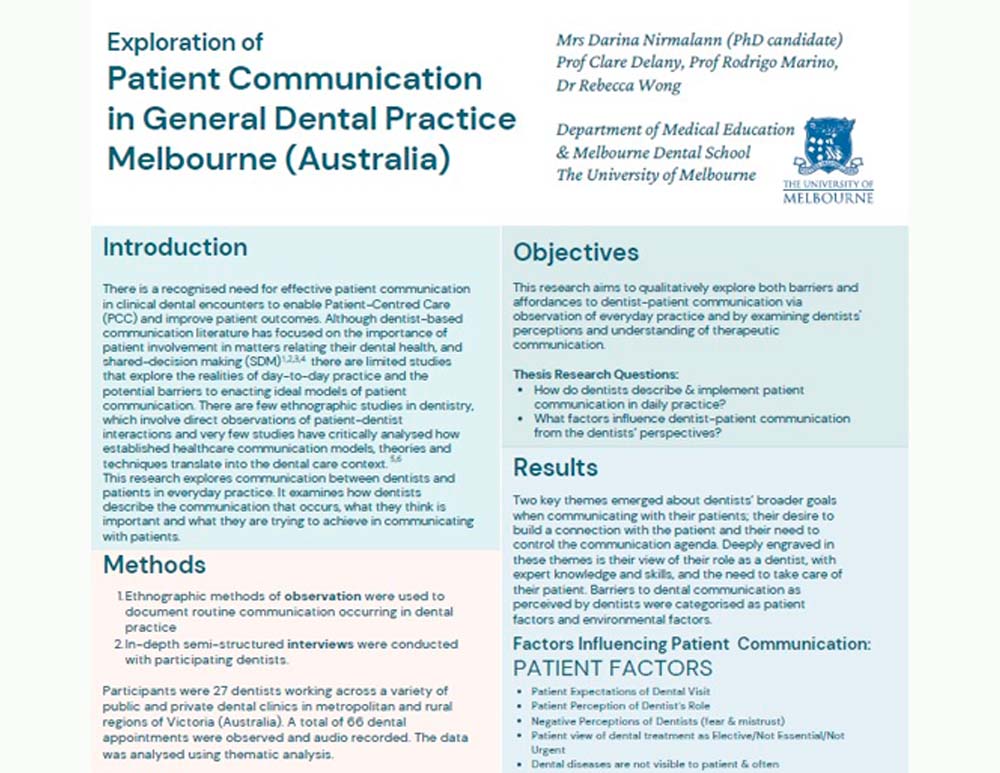
Exploration of Patient Communication in General Dental Practice in Melbourne
Author: Darina Nirmalann
University: The University of Melbourne
Discipline: Dentistry
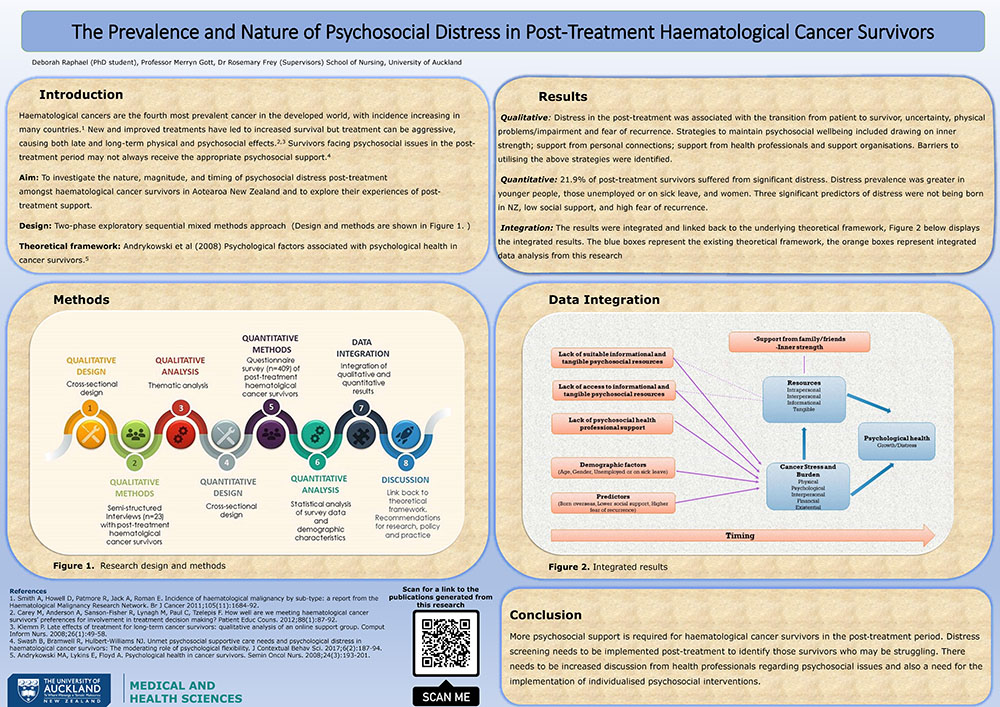
Psychosocial Distress in Post-Treatment Haematological Cancer Survivors
Author: Deborah Raphael
University: University of Auckland
Discipline: Health Sciences
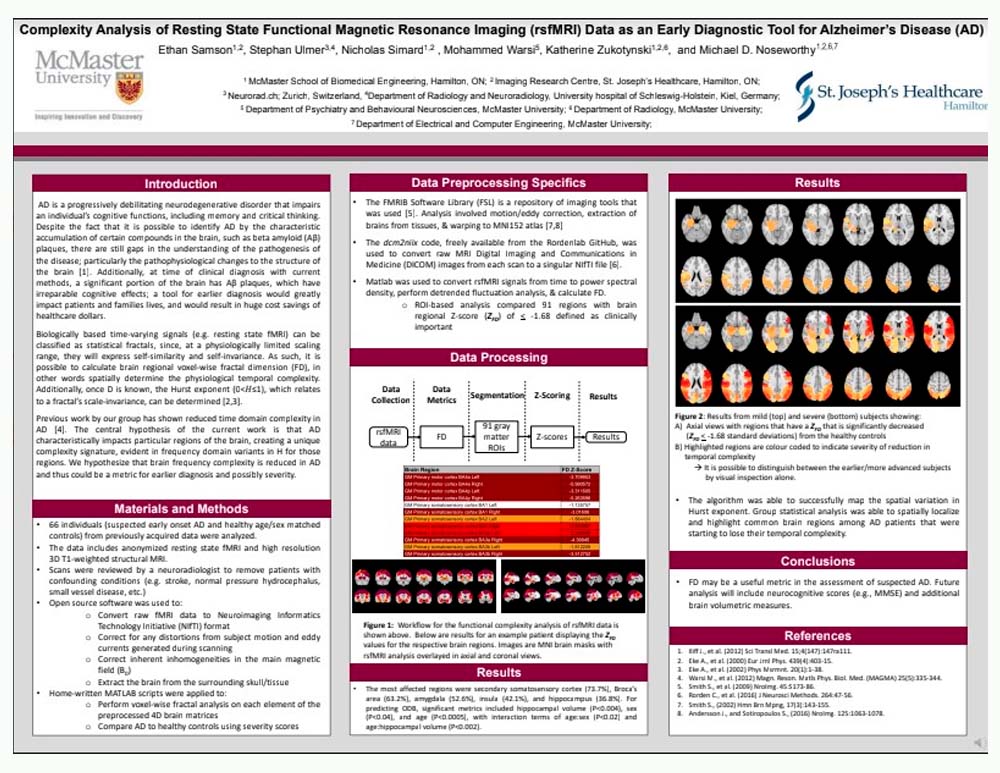
Complexity Analysis of Resting State Functional Magnetic Resonance Imaging (rsfMRI) Data as an Early Diagnostic Tool for Alzheimer’s Disease (AD)
Author: Ethan Samson
University: McMaster University
Discipline: Biomedical Engineering
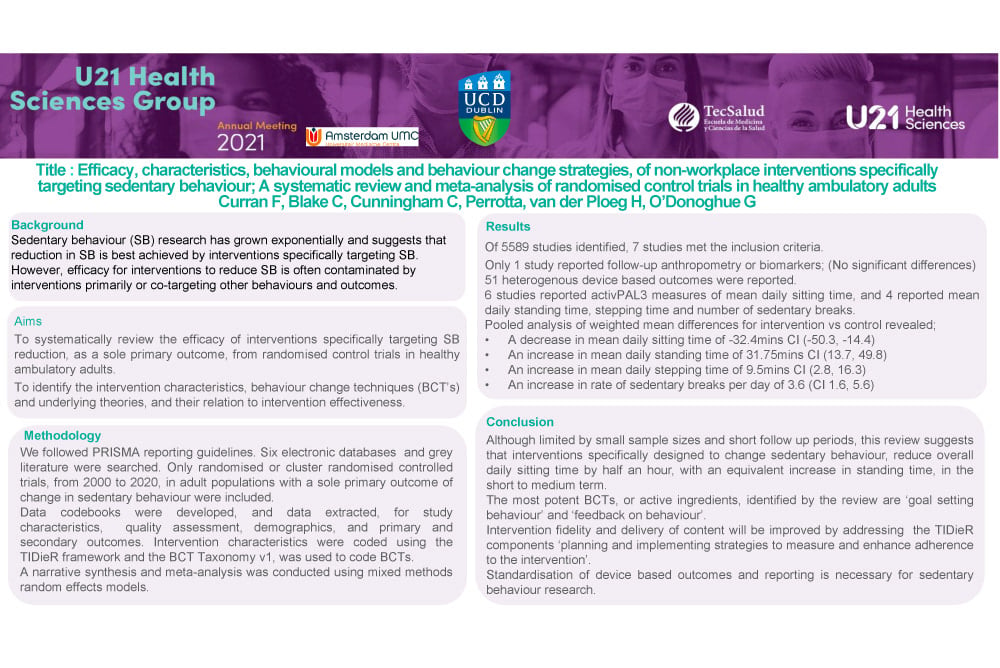
Development of a Complex intervention to interrupt sedentary time in people living with obesity
Author: Fiona Curran
University: University College Dublin
Discipline: Public Health Physiotherapy and Sport Science
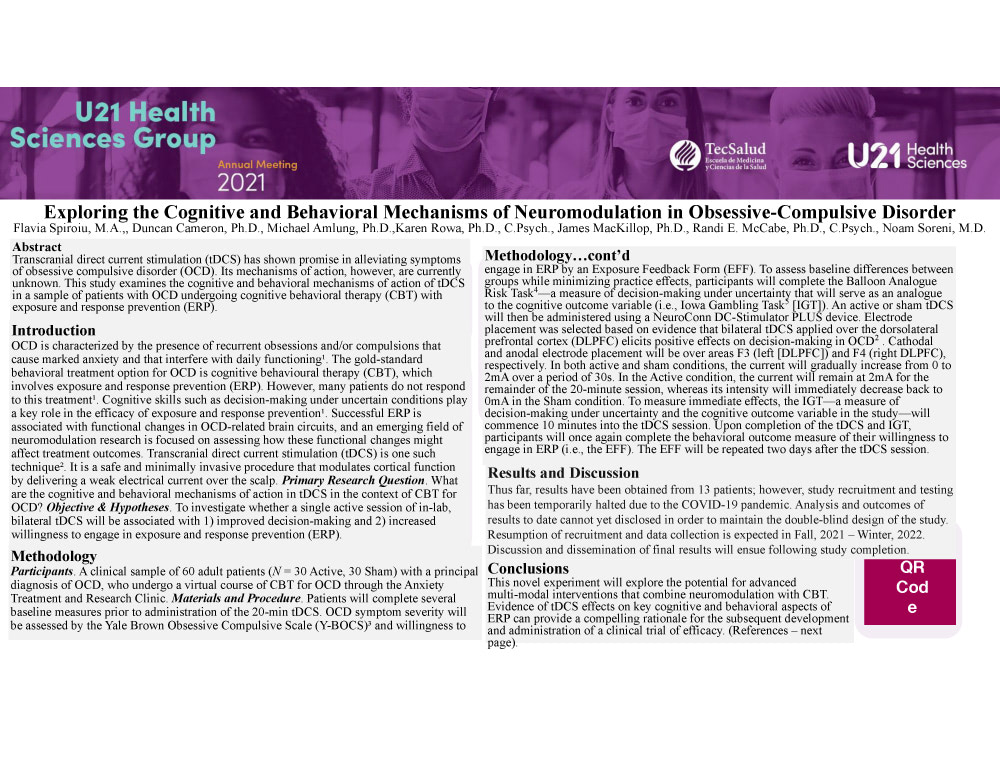
Cognitive and Behavioural Mechanisms of Transcranial Direct Current Stimulation in Obsessive-Compulsive Disorder
Author: Flavia Spiroiu
University: McMaster University
Discipline: Neuroscience Graduate Program
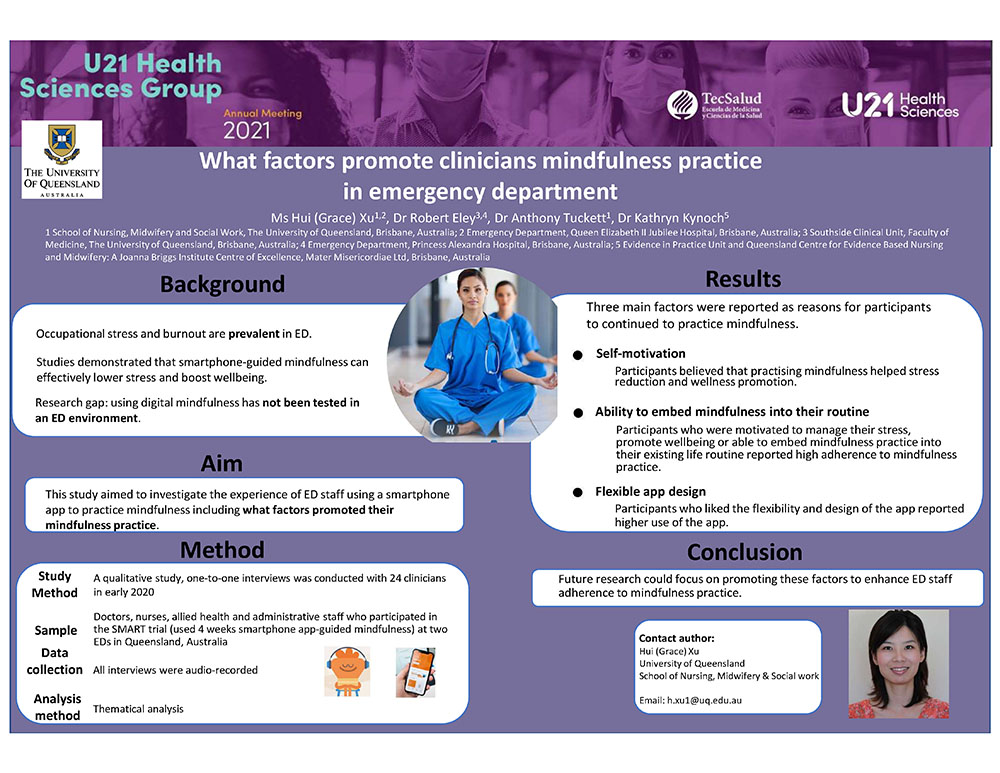
What factors promote clinicians mindfulness practice in the emergency department
Author: Hui (Grace) Xu
University: University of Queensland
Discipline: Nursing
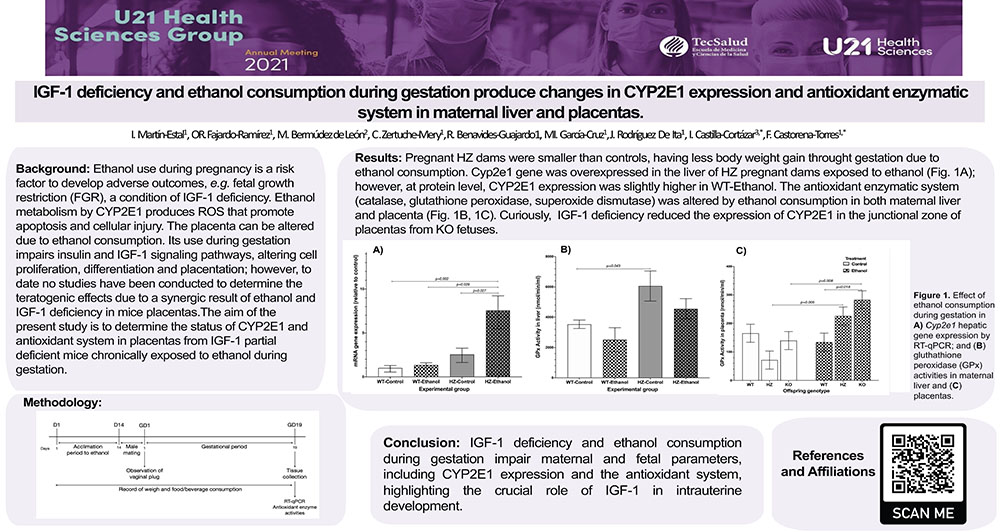
Role of CYP2E1 and antioxidant system in placenta injury in a murine model with
Author: Irene Martin Del Estal
University: Tecnologico de Monterrey
Discipline: Biomedical Sciences
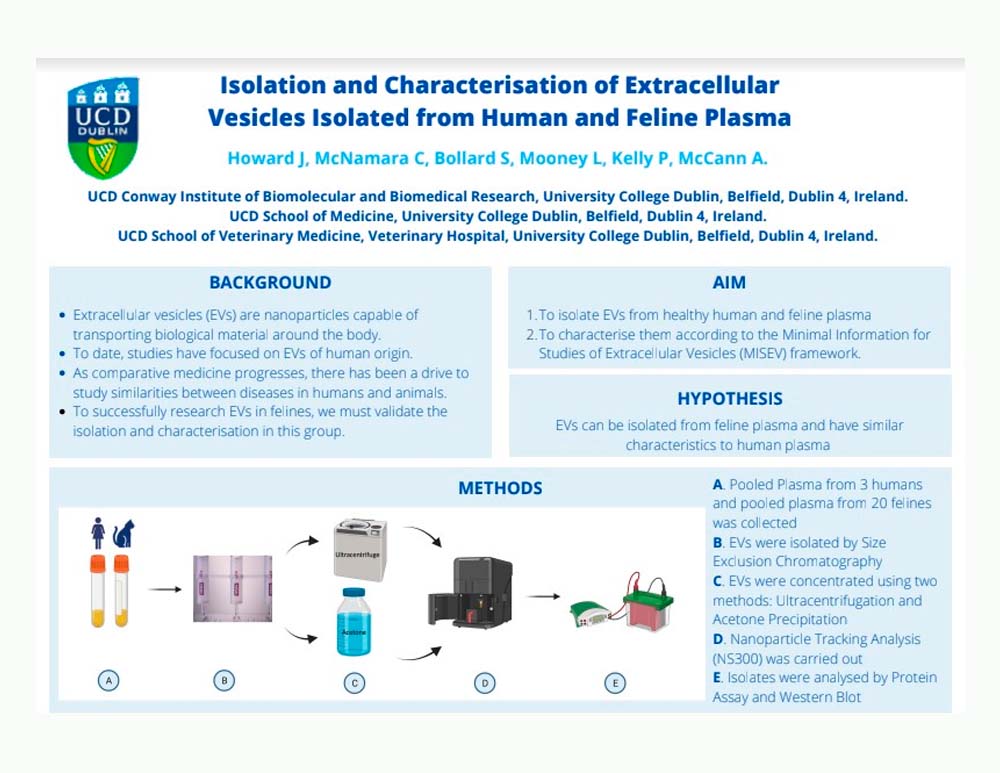
A Comparative Medicine Approach to TNBC Treatment Response and Progression
Author: Jane Howard
University: University College Dublin
Discipline: One Health
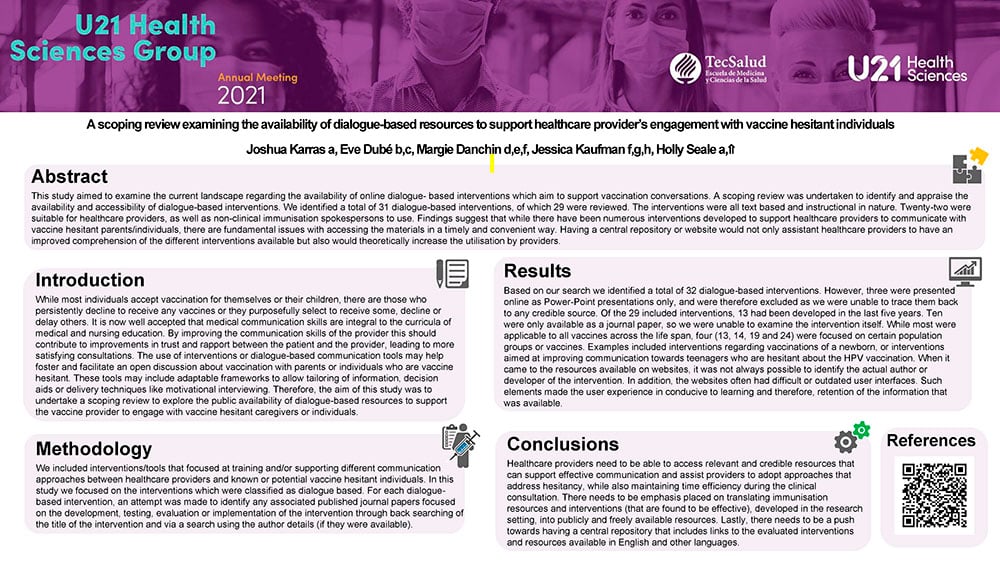
A scoping review examining the availability of dialogue-based resources
Author: Joshua Karras
University: UNSW
Discipline: Public Health
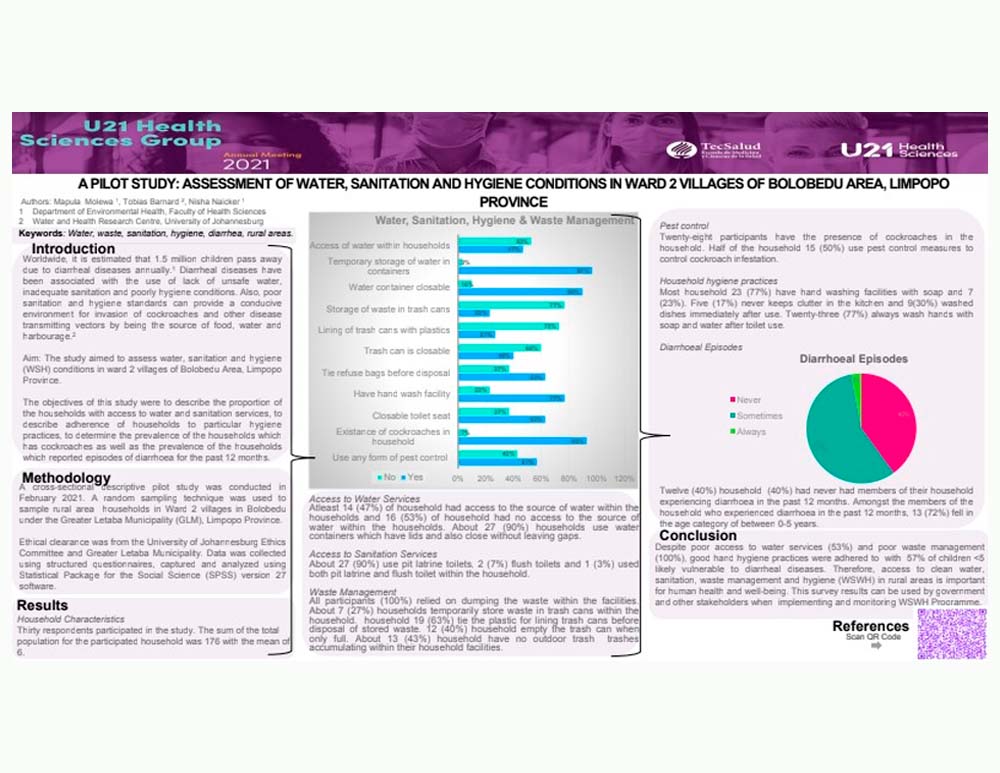
THE ASSESSMENT OF THE ROLE OF COCKROACHES IN BACTERIAL DISSEMINATION
Author: Mapula Luckyjane Molewa
University: University of Johannesburg
Discipline: Environmental Health
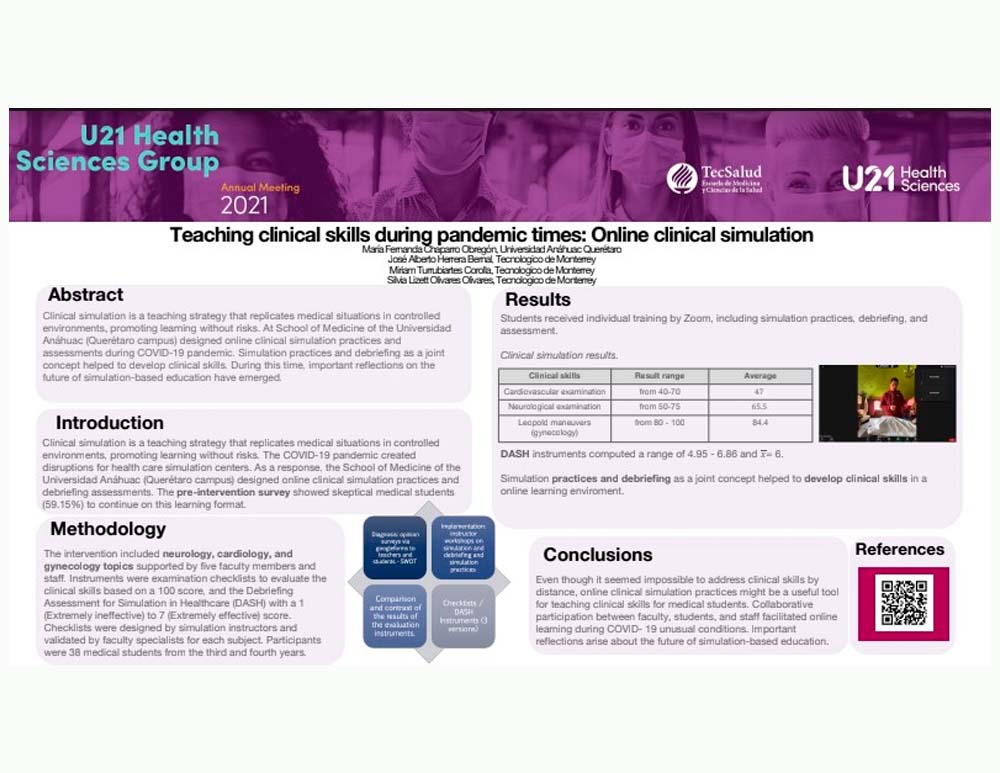
Teaching clinical skills during pandemic times: Online clinical simulation
Author: María Fernanda Chaparro Obregón
University: Tecnologico de Monterrey, Universidad Anáhuac Querétaro
Discipline: Medical Education
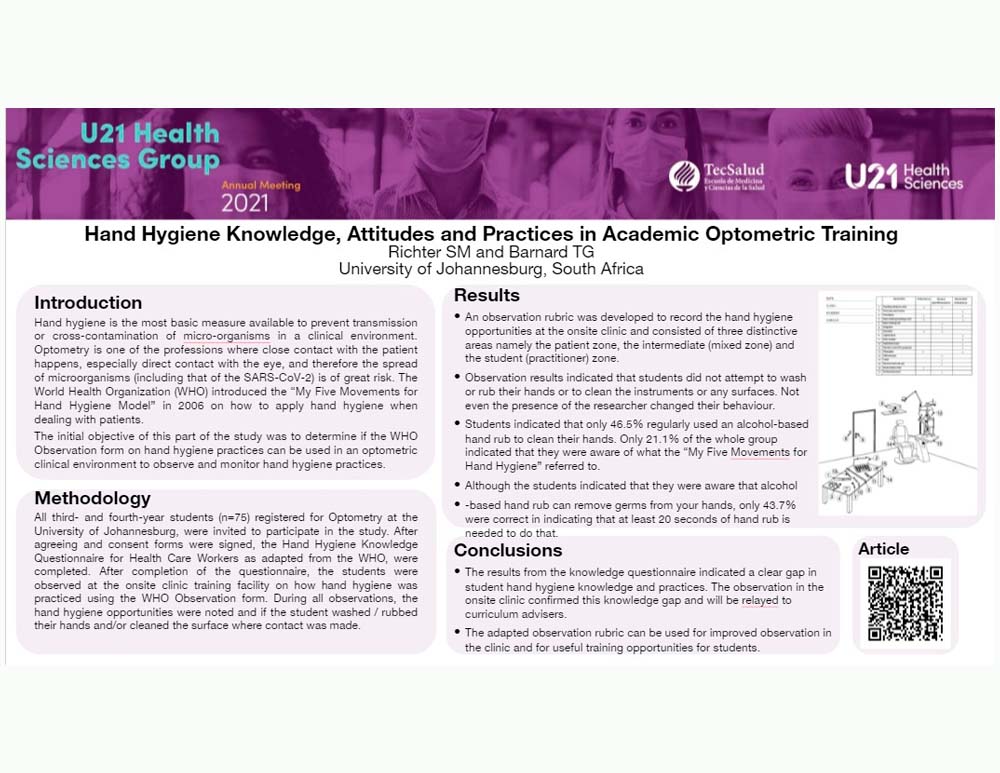
Hand Hygiene Knowledge, Attitudes and Practices in Academic Optometric Training
Author: Marietjie Richter
University: University of Johannesburg
Discipline: Optometry
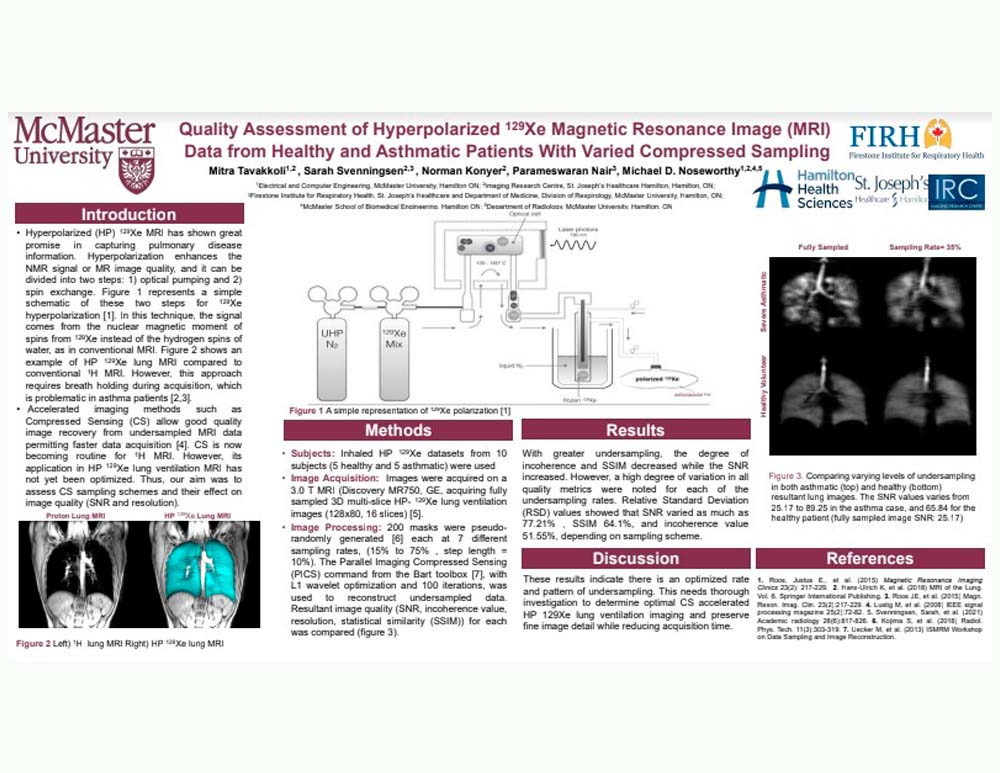
Hyperpolarized Xenon (129Xe) Magnetic Resonance Imaging (MRI) With Varied Compressed Sense Sampling
Author: Mitra Tavakkoli
University: McMaster University
Discipline: Electrical and Computer Engineering
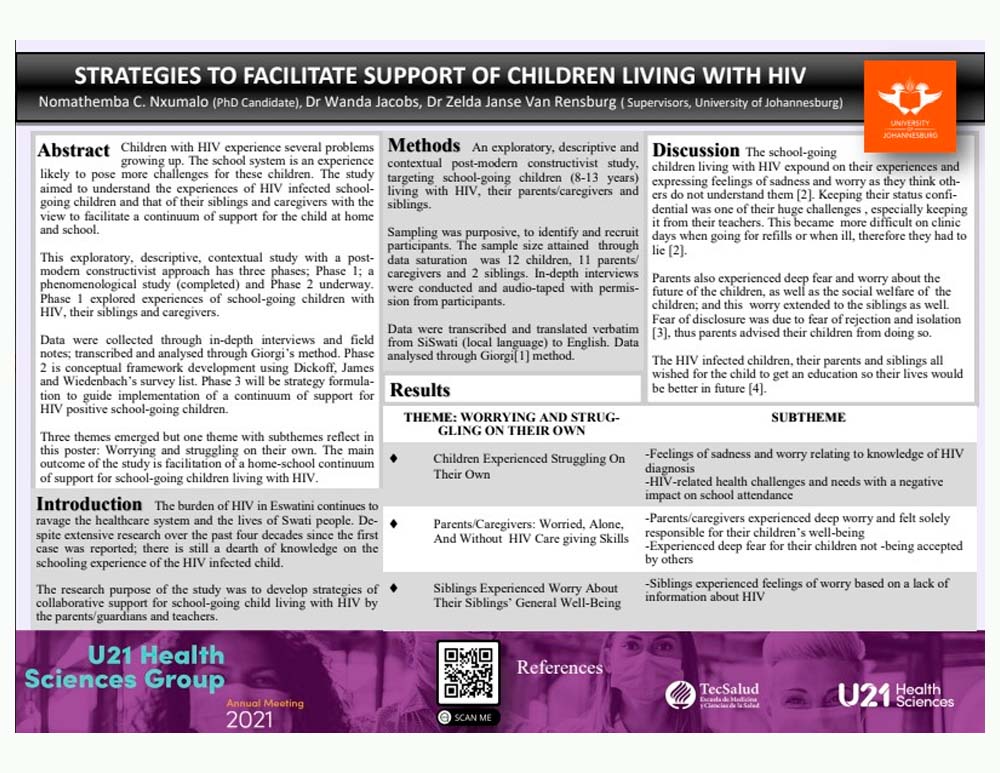
STRATEGIES TO FACILITATE A HOME-SCHOOL CONTINUUM OF SUPPORT FOR SCHOOL-GOING CHILDREN LIVING WITH HIV
Author: Nomathemba Nxumalo
University: University of Johannesburg
Discipline: PhD in Mother and Child Nursing Science
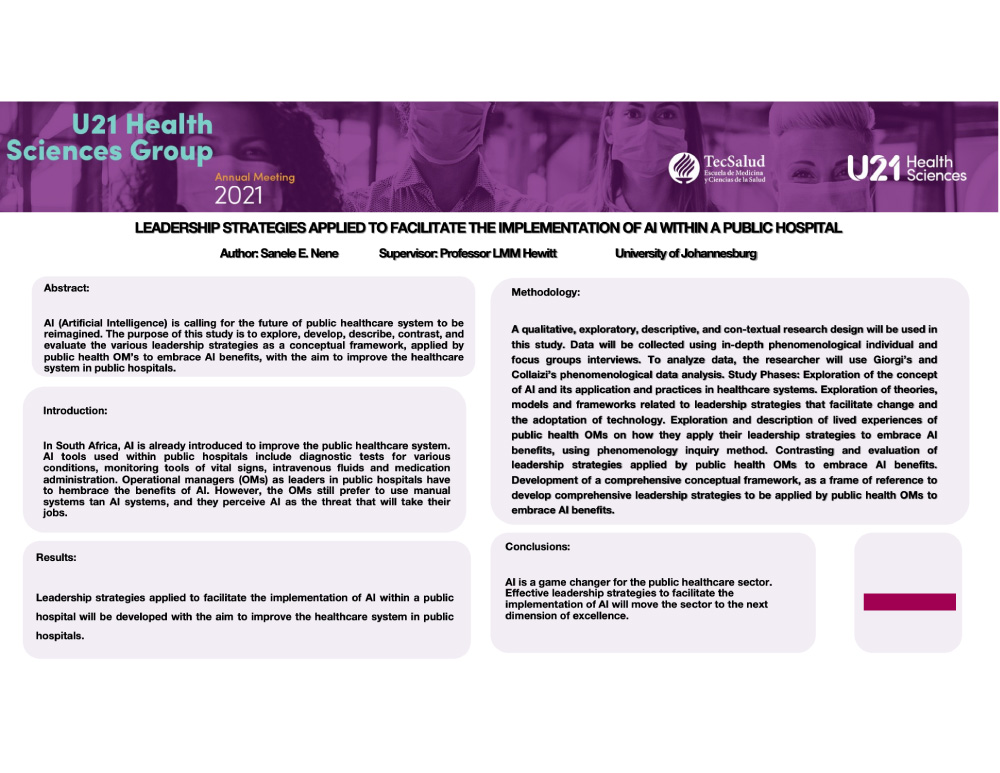
Leadership strategies applied to facilitate the implementation of Artificial Intelligencewithin a public hospital
Author: Sanele Nene
University: University of Johannesburg
Discipline: Nursing
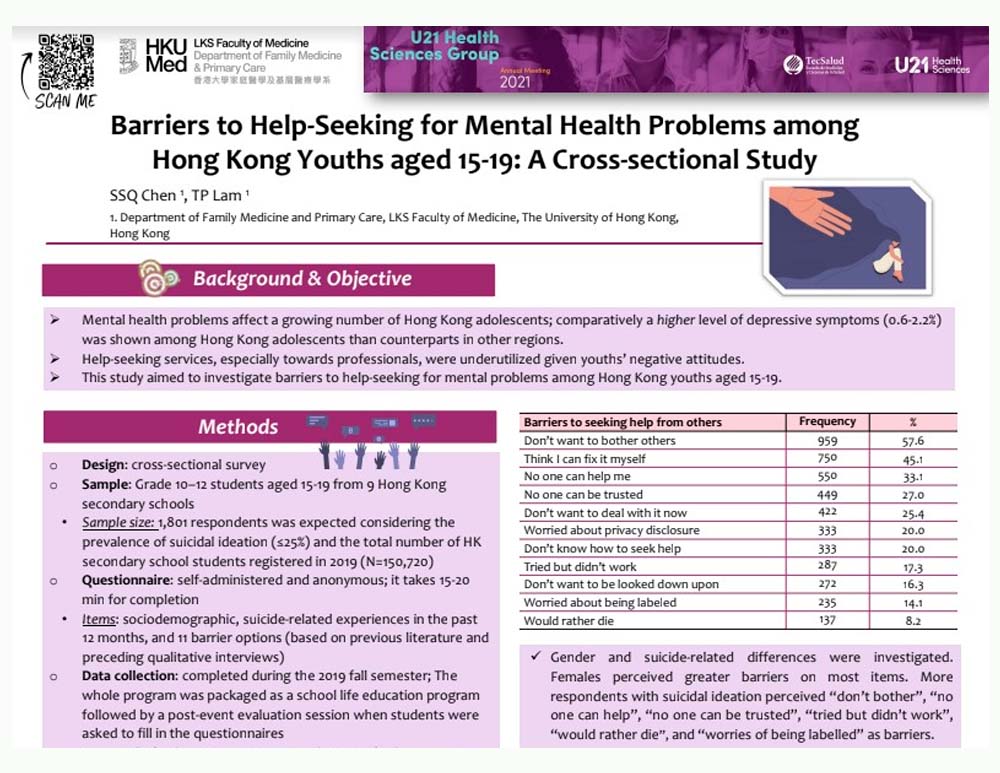
Hong Kong youths´ attitudes towards suicide, coping strategies and online help-seeking
Author: Sikky Shiqi Chen
University: The University of Hong Kong
Discipline: Mental Health
Teaching Excellence Award Workshop
Workshop title: Experiences of the Online Educator, Pandemic and Beyond
Sheila Harms, McMaster University,
Norman Ng, University of Queensland
Workshop description: The COVID 19 pandemic has undoubtedly influenced the practice of education for educators around the world. Necessary digital adaptations were frequently mandated to ensure minimal disruptions to Health Professions Education (HPE), wherever possible. This context provides a unique opportunity to ask a series of questions about HPE, including: how satisfied were HPEs about their roles as teacher prior the pandemic? What were some of the pre-pandemic online educational practices that were emerging for HPEs? In general, how satisfied were students with online learning prior to the pandemic? These questions now form a backdrop to interpret peri-pandemic literature about the experience of educators. More specifically, the purpose of this interactive workshop is to provide an opportunity for U21 Health Sciences Group HPEs to come together to reflect on their experiences as educators from around the world during the pandemic and to review the literature about educator experiences within this unique context. Do we see our educator selves and our pandemic stories reflected in the available literature? Why might this matter? Focusing on the educator voice, we aim to bring to the fore a discussion about what makes an educational practice sustainable during these challenging times and how the educator experience is critical in shaping an ongoing agenda of student engagement.
Winners
Sheila Harms: harmssh@hhsc.ca, university profile.
Norman Ng: n.ng@uq.edu.au, university profile.
Speakers
%2015.37.37.png?width=150&name=Captura%20de%20Pantalla%202021-07-23%20a%20la(s)%2015.37.37.png)
Dr Sheila Harms
McMaster University
Dr. Sheila Harms is an Associate Professor and Associate Chair in Education in the Department of Psychiatry and Behavioural Neurosciences, Faculty of Health Sciences at McMaster University. Dr. Harms practices as a Child and Adolescent Psychiatrist at McMaster Children’s Hospital with a focus on general outpatient care. She is actively involved in supervising undergraduate and postgraduate learners as well as teaching within the Faculty of Health Sciences. Dr. Harms has acted in numerous educational leadership roles within the department including the program director for Postgraduate Psychiatry Training and has held the role of the inaugural program director for subspecialty training in Child and Adolescent Psychiatry. She is also an active member on the Psychiatry Exam Board for the Royal College of Physicians and Surgeons of Canada. Dr. Harms directs the global mental health initiative in the department which includes leading a long-standing collaboration and novel educational initiative at Mbarara University of Science and Technology (MUST) in Western Uganda, where she also serves on faculty. Currently, she is focusing on enhancing educational scholarship activities across the department. She is pursuing a PhD in education at York University under the supervision of Distinguished Research Professor, Dr. Deborah Britzman. Her PhD focuses on critical histories in Psychiatry and how they have influenced her pedagogical experience as a Psychiatry educator. Dr. Harms is particularly interested in thinking about medical education using psychodynamic concepts as they are applied to learning, in an attempt to understand educational phenomenology that are both relevant and pressing in contemporary medical education.
%2015.38.07.png?width=150&name=Captura%20de%20Pantalla%202021-07-23%20a%20la(s)%2015.38.07.png)
Dr Norman Ng
University of Queensland
Dr Norman Ng is a lecturer with the Faculty of Health and Behavioural Sciences, at The University of Queensland. He received his PhD from the School of Human Movement and Nutrition Sciences, University of Queensland in 2009. Norman has a background in physical activity and health, particularly the role of physical activity in managing chronic diseases, such as Type 2 diabetes and osteoarthritis.
His research interests include physical activity measurement and occupational sedentary behaviour. Norman is a Senior Fellow of the Higher Education Academy and has contributed to both undergraduate and postgraduate programs across a range of courses in various learning settings. His scholarship of teaching and learning includes active learning in higher education, interprofessional teaching and learning in virtual learning environments and digital spaces, and professional identities of allied health students. Norman is the inaugural Lecturer in Interprofessional Education at The University of Queensland and the Course Coordinator of a large blended interprofessional foundations course with approximately 1500 students. He is currently investigating the attitudes and readiness of first year students towards interprofessional education and best practices in continuing and supporting interprofessional experiences for a post-pandemic learning environment.
Modal title
.png)

The School of Medicine and Health Sciences is distinguished by having a patient-centered innovative educational model, a transformative university experience, and research as a key component of excellent medical practice
Students graduate with the perspective of becoming the leaders of medicine and health sciences in México by developing in the axes of our innovation: training, care, research, and social commitment.
Visit México
México is a sovereign nation of North America, of Latin American culture, whose territory was the cradle of one of the oldest civilizations in the world: Mesoamerican. Officially known as the United Mexican States, like all Latin American countries, México exhibits an important cultural and racial mixture, in which indigenous people, European and African took part.
- Best Beaches in México
- Archaeological Sites
- Adventure & Ecotourism
- Pueblos Mágicos (Magical Towns)

Tecnológico de Monterrey, School of Medicine and Health Sciences
Conference Planning Committee
Communications: Margarita Espino Barros Jiménez



